2004 – 2005, Roland Garros
French Open, Paris
May 24-June 6, 2004; 128 Draw (32 seeds); Surface – Clay
The last Roland Garros before Rafael Nadal’s debut in Paris (and his incredible domination) was absolutely exceptional, abounding with unprecedented occurrences: Jerome Heahnel, who never played a tour level match before, ousted Andre Agassi in straight sets producing one of the biggest upsets in the history of men’s tennis, defending champion (Juan Carlos Ferrero) lost in straight sets as well, to a player, who hadn’t won a Grand Slam match before RG ’04 (Igor Andreev), Fabrice Santoro won the longest match in the French Open history, Vincent Spadea equaled a record for the most match points saved in a Grand Slam event, Marat Safin won two consecutive matches withstanding match points on return, Roger Federer for the last time in nine years (!) lost a major match before quarterfinals, Tim Henman became the first Englishman in 41 years to reach the semifinals at Roland Garros and the first serve-and-volleyer since 1997, Xavier Malisse & Olivier Rochus became the first Grand Slam doubles champions not having won a doubles title before, finally Gaston Gaudio, who hadn’t progressed beyond fourth round of a major prior to the French Open 2004, became the last unseeded Grand Slam champion thus far, winning the Grand Slam final from a match point down as the first player since the Australian Open final in 1960!
First round: (AP, Jim Haley)
Top men’s seed Roger Federer strode confidently into the second round of the French Open tennis yesterday. Federer, 22, ended his Roland Garros jinx by beating Belgian newcomer Kristof Vliegen 6-1, 6-2, 6-1 on his third match point after 1 hour 16 minutes on Court Suzanne Lenglen. The Wimbledon and Australian Open champion, hoping to complete a Grand Slam of titles this year, was never bothered by the 110th-ranked Belgian, who only reached the main draw as a lucky loser after being beaten in the final round of qualifying. The world number one needed just 20 minutes to wrap up the first set with Vliegen putting up the only real opposition in the final game when he saved two match points before Federer wrapped up the tie with a forehand winner. The Swiss, widely considered the finest player of the current generation, has suffered first round defeats on the slow, red clay of Roland Garros in the last two years. Bidding to better his previous best, a quarter-final appearance in 2001, Federer next meets Germany’s Nicolas Kiefer whom he 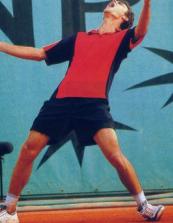 trails 2-3 in their previous meetings but whom he has never played on clay. Kiefer advanced by beating Frenchman Thierry Ascione 6-3, 6-2, 6-2. Last year’s surprise runner-up Martin Verkerk of the Netherlands, seeded 19, won his opening match 7-5, 6-3, 6-1 against France’s Julien Boutter. Gustavo Kuerten [30] left his opponent in tears. The three-time French Open champion struggled through his first-round match Tuesday against qualifier Nicolas Almagro of Spain, winning 7-5, 7-6(2), 1-6, 3-6, 7-5. The 18-year-old Almagro [130], playing his first major match, erased a break point trailing 1:4, and served at 5:4 (30/15) in the 5th set! After the match, Almagro sat in his chair, threw his towel over his head and wept, his bottom lip trembling. A relieved Kuerten smiled and signed tennis balls for his adoring fans. “The crowd helped me a lot in the fifth set,” Kuerten said. “The match was getting tight and I needed their enthusiasm at that stage. They gave me a lift.” A former world No. 1, the Brazilian, seeded 28th, was one of six Grand Slam tournament winners on court Tuesday. The others were defending champion Juan Carlos Ferrero, Lleyton Hewitt, Federer, Albert Costa and Marat Safin. Ferrero overcame a dropped first set and bruised ribs to beat Germany’s Tommy Haas 3-6, 6-4, 6-4, 6-2. The fourth-seeded Ferrero said he took an injection to numb the pain. “I took (painkillers) just half an hour before the match to put my ribs to sleep, but then it started to wake up again,” Ferrero said. Meanwhile, Hewitt, Safin and Costa also won their opening matches. Hewitt, seeded 12th, defeated Arnaud Di Pasquale of France 6-0, 7-6(5), 4-6, 6-1. Russia’s Safin, seeded 20th, advanced when Agustin Calleri of Argentina quit while behind 7-5, 1-6, 1-4. Costa, the 26th seed from Spain, beat Flavio Saretta of Brazil 6-2, 6-2, 6-7(2), 6-4. The atmosphere in the Kuerten-Almagro match was so noisy and rowdy at times it resembled a soccer stadium. “I get a lot of good vibes when I come to Paris every year,” said Kuerten, a big soccer fan nicknamed “Guga.” “They like the way I play and I try and give the same feeling back to the crowd.” Kuerten won his most recent French Open title in 2001, with previous wins in 1997 and 2000. But since right hip surgery in February 2002, he has not gotten past the fourth round at Roland Garros – or in any other Grand Slam event. His best big tournament since then was a runner-up finish at the Indian Wells Masters, where he lost to Hewitt in straight sets. A recurrence of the injury saw him pull out of the Rome Masters earlier this month. He also sat out Hamburg, although he did win on home clay at Costa Do Sauipe – his lone title this year. “I still have a lot of problem with my physical condition,” he said. “But coming here and playing five sets straight away is satisfying. It will take me a while to get back to 100 percent.” Fabrice Santoro rolled in the red clay at Roland Garros, then wept after defeating fellow Frenchman Arnaud Clement 6-4, 6-3, 6-7(5), 3-6, 16-14 on Tuesday at the French Open. The 6-hour, 33-minute match – played over two days – is the longest in tennis’ Open era, which began in 1968. Moments later, Santoro sat on his chair and threw a towel over his head, “I only took 1 liter of water out with me today,” Santoro said (the match was suspended due to darkness at 5-all in the decider). “I told myself we’d play maybe 10 or 15 minutes. I didn’t think I had another two hours in my legs.” The match beat the previous mark held by John McEnroe and Mats Wilander. They battled
trails 2-3 in their previous meetings but whom he has never played on clay. Kiefer advanced by beating Frenchman Thierry Ascione 6-3, 6-2, 6-2. Last year’s surprise runner-up Martin Verkerk of the Netherlands, seeded 19, won his opening match 7-5, 6-3, 6-1 against France’s Julien Boutter. Gustavo Kuerten [30] left his opponent in tears. The three-time French Open champion struggled through his first-round match Tuesday against qualifier Nicolas Almagro of Spain, winning 7-5, 7-6(2), 1-6, 3-6, 7-5. The 18-year-old Almagro [130], playing his first major match, erased a break point trailing 1:4, and served at 5:4 (30/15) in the 5th set! After the match, Almagro sat in his chair, threw his towel over his head and wept, his bottom lip trembling. A relieved Kuerten smiled and signed tennis balls for his adoring fans. “The crowd helped me a lot in the fifth set,” Kuerten said. “The match was getting tight and I needed their enthusiasm at that stage. They gave me a lift.” A former world No. 1, the Brazilian, seeded 28th, was one of six Grand Slam tournament winners on court Tuesday. The others were defending champion Juan Carlos Ferrero, Lleyton Hewitt, Federer, Albert Costa and Marat Safin. Ferrero overcame a dropped first set and bruised ribs to beat Germany’s Tommy Haas 3-6, 6-4, 6-4, 6-2. The fourth-seeded Ferrero said he took an injection to numb the pain. “I took (painkillers) just half an hour before the match to put my ribs to sleep, but then it started to wake up again,” Ferrero said. Meanwhile, Hewitt, Safin and Costa also won their opening matches. Hewitt, seeded 12th, defeated Arnaud Di Pasquale of France 6-0, 7-6(5), 4-6, 6-1. Russia’s Safin, seeded 20th, advanced when Agustin Calleri of Argentina quit while behind 7-5, 1-6, 1-4. Costa, the 26th seed from Spain, beat Flavio Saretta of Brazil 6-2, 6-2, 6-7(2), 6-4. The atmosphere in the Kuerten-Almagro match was so noisy and rowdy at times it resembled a soccer stadium. “I get a lot of good vibes when I come to Paris every year,” said Kuerten, a big soccer fan nicknamed “Guga.” “They like the way I play and I try and give the same feeling back to the crowd.” Kuerten won his most recent French Open title in 2001, with previous wins in 1997 and 2000. But since right hip surgery in February 2002, he has not gotten past the fourth round at Roland Garros – or in any other Grand Slam event. His best big tournament since then was a runner-up finish at the Indian Wells Masters, where he lost to Hewitt in straight sets. A recurrence of the injury saw him pull out of the Rome Masters earlier this month. He also sat out Hamburg, although he did win on home clay at Costa Do Sauipe – his lone title this year. “I still have a lot of problem with my physical condition,” he said. “But coming here and playing five sets straight away is satisfying. It will take me a while to get back to 100 percent.” Fabrice Santoro rolled in the red clay at Roland Garros, then wept after defeating fellow Frenchman Arnaud Clement 6-4, 6-3, 6-7(5), 3-6, 16-14 on Tuesday at the French Open. The 6-hour, 33-minute match – played over two days – is the longest in tennis’ Open era, which began in 1968. Moments later, Santoro sat on his chair and threw a towel over his head, “I only took 1 liter of water out with me today,” Santoro said (the match was suspended due to darkness at 5-all in the decider). “I told myself we’d play maybe 10 or 15 minutes. I didn’t think I had another two hours in my legs.” The match beat the previous mark held by John McEnroe and Mats Wilander. They battled 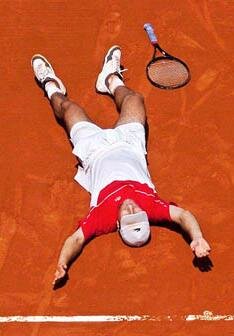 for 6:22 in a Davis Cup quarterfinal between the United States and Sweden in 1982. McEnroe won the 79-game slugfest 9-7, 6-2, 15-17, 3-6, 8-6. “I don’t care (about the record). What do I get? A medal?” Clement said after his fourth first-round exit at Roland Garros in eight attempts. “There may be an even longer match tomorrow,” he said. “I don’t play tennis to spend as much time possible on court.” Santoro saved two match points – one on each day. The first came when serving at 4:5 in the 5th set (earlier 0:3) late Monday evening. Then, facing a break point while trailing 14:13 Tuesday, Santoro frustrated Clement into a mistake – his opponent hurrying a winner into the net after a long rally marked by looping shots that bounced on the red dust like beach balls. “I came very close to defeat, it’s a miracle,” Santoro said. “I tried to stay relaxed on the important points and if it looked that way, then I did a good job because I was very tense.” Santoro broke Clement to love to go up 15:14 but then trailed 0/40 when serving. With three break points to pull even, Clement froze: two routine passing shots hit the net, a miscued lob sailed over Santoro and out. “Depechez vous! (Hurry up!)” a voice cried from the crowd on Suzanne Lenglen Court. No one laughed – especially not Santoro, who momentarily lost his concentration and had to steady himself again. He smacked his 22nd ace of the match to set up victory, sealed by a passing shot while stretching at full speed. “I decided I had to take a risk,” Santoro said, referring to his winner. The match lasted 463 points. Santoro won 235, including the last one on a backhand winner. After playing for 4:38 Monday, the match lasted 1:55 on Tuesday. There was no poignant moment at the finish despite the valiant duel. No slap on the back at the net, no warm smile, no disbelieving shake of the head. Simply a polite handshake like strangers meeting for the first time. “We could have fallen into each others arms, but we didn’t,” Santoro said. “Frankly, it could have been a longer handshake. But put yourself in Arnaud’s shoes. He’s bitterly disappointed.” The longest prior match at a Grand Slam was in 1998 when Spain’s Alex Corretja took 5:31 to defeat Argentina’s Hernan Gumy at Roland Garros. Santoro could have won the match in straight sets, but blew a 5:3
for 6:22 in a Davis Cup quarterfinal between the United States and Sweden in 1982. McEnroe won the 79-game slugfest 9-7, 6-2, 15-17, 3-6, 8-6. “I don’t care (about the record). What do I get? A medal?” Clement said after his fourth first-round exit at Roland Garros in eight attempts. “There may be an even longer match tomorrow,” he said. “I don’t play tennis to spend as much time possible on court.” Santoro saved two match points – one on each day. The first came when serving at 4:5 in the 5th set (earlier 0:3) late Monday evening. Then, facing a break point while trailing 14:13 Tuesday, Santoro frustrated Clement into a mistake – his opponent hurrying a winner into the net after a long rally marked by looping shots that bounced on the red dust like beach balls. “I came very close to defeat, it’s a miracle,” Santoro said. “I tried to stay relaxed on the important points and if it looked that way, then I did a good job because I was very tense.” Santoro broke Clement to love to go up 15:14 but then trailed 0/40 when serving. With three break points to pull even, Clement froze: two routine passing shots hit the net, a miscued lob sailed over Santoro and out. “Depechez vous! (Hurry up!)” a voice cried from the crowd on Suzanne Lenglen Court. No one laughed – especially not Santoro, who momentarily lost his concentration and had to steady himself again. He smacked his 22nd ace of the match to set up victory, sealed by a passing shot while stretching at full speed. “I decided I had to take a risk,” Santoro said, referring to his winner. The match lasted 463 points. Santoro won 235, including the last one on a backhand winner. After playing for 4:38 Monday, the match lasted 1:55 on Tuesday. There was no poignant moment at the finish despite the valiant duel. No slap on the back at the net, no warm smile, no disbelieving shake of the head. Simply a polite handshake like strangers meeting for the first time. “We could have fallen into each others arms, but we didn’t,” Santoro said. “Frankly, it could have been a longer handshake. But put yourself in Arnaud’s shoes. He’s bitterly disappointed.” The longest prior match at a Grand Slam was in 1998 when Spain’s Alex Corretja took 5:31 to defeat Argentina’s Hernan Gumy at Roland Garros. Santoro could have won the match in straight sets, but blew a 5:3 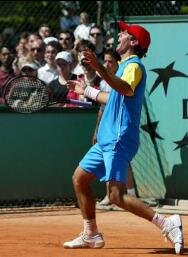 lead in the tie-break. In other 5-set thriller featuring just one French player: Vincent Spadea equaled the biggest number of match points saved in a Grand Slam match (9) overcoming Florent Serra 7-5, 1-6, 4-6, 7-6(7), 9-7 in 4 hours 32 minutes. This was a match in which Spadea was outplayed for three hours or more and when he had to constantly organize comebacks. He looked like a loser in the 4th set when he called the trainer to court to tend to a hamstring injury. And then he went down *0:4 and 1:5 in the fifth set. He faced his first match point at 6:7 in the tie-break. Then, serving at 3:5 in the final set, he saved a second at 30/40 and two more in the same game. The final five match points came in the next game when Spadea [28] went down 0/40 on return and Serra [224] had two ads. Twice in that game, on match point, Serra double-faulted. He was so distraught afterward that players said he was crying uncontrollably in the locker room. “I just played aggressively at 1:5 to get back into the match and he got a little bit tight,” Spadea said. It was Serra’s Grand Slam debut! Nine match points saved also Christophe Roger-Vasselin defeating Marcos Hocevar 6-7, 3-6, 7-6, 7-6, 6-0 in the French Open first round in 1982. World number 271 Jerome Haehnel produced the shock result of the year by
lead in the tie-break. In other 5-set thriller featuring just one French player: Vincent Spadea equaled the biggest number of match points saved in a Grand Slam match (9) overcoming Florent Serra 7-5, 1-6, 4-6, 7-6(7), 9-7 in 4 hours 32 minutes. This was a match in which Spadea was outplayed for three hours or more and when he had to constantly organize comebacks. He looked like a loser in the 4th set when he called the trainer to court to tend to a hamstring injury. And then he went down *0:4 and 1:5 in the fifth set. He faced his first match point at 6:7 in the tie-break. Then, serving at 3:5 in the final set, he saved a second at 30/40 and two more in the same game. The final five match points came in the next game when Spadea [28] went down 0/40 on return and Serra [224] had two ads. Twice in that game, on match point, Serra double-faulted. He was so distraught afterward that players said he was crying uncontrollably in the locker room. “I just played aggressively at 1:5 to get back into the match and he got a little bit tight,” Spadea said. It was Serra’s Grand Slam debut! Nine match points saved also Christophe Roger-Vasselin defeating Marcos Hocevar 6-7, 3-6, 7-6, 7-6, 6-0 in the French Open first round in 1982. World number 271 Jerome Haehnel produced the shock result of the year by 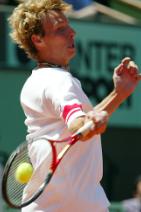 beating Andre Agassi in the French Open first round. Frenchman Haehnel beat the sixth seed 6-4, 7-6(4), 6-3 to delight the home crowds at Roland Garros. Haehnel, 23, had never played a tour level match before this victory. Agassi, who has won every Grand Slam in a superb career, had played just one warm-up event in the build-up to Paris, again suffering defeat to an outsider. His loss will lead to increased speculation that the 34-year-old will retire at the end of the season. Asked if he would return to Roland Garros, the eight-times Grand Slam champion replied: “Hard to say. You want to come back, but you just don’t know. I don’t know. It’s a year away, and that’s a long time for me right now. The chances get less every year, that’s for sure.” Haehnel admitted to battling nerves as he closed out his famous victory. “I was very nervous,” he said: “I tried to keep the ball in and take my time because the courts were very fast.” British ninth seed Tim Henman made an unimpressive start to his French Open campaign when he beat Frenchman Cyril Saulnier 4-6, 4-6, 7-6(2), 6-4, 6-3. Henman, who has never been beyond the third round on the slow Roland Garros clay, was in dire straits after handing his 79th-ranked opponent the first two sets with a stream of unforced errors. Henman recovered to snatch the third set on a tie-break and gradually Saulnier, who has never won a match at Roland Garros, wilted in the Parisian sunshine. Henman levelled the match and dominated the fifth set, sealing victory in 3 hours 48 minutes when Saulnier double-faulted.
beating Andre Agassi in the French Open first round. Frenchman Haehnel beat the sixth seed 6-4, 7-6(4), 6-3 to delight the home crowds at Roland Garros. Haehnel, 23, had never played a tour level match before this victory. Agassi, who has won every Grand Slam in a superb career, had played just one warm-up event in the build-up to Paris, again suffering defeat to an outsider. His loss will lead to increased speculation that the 34-year-old will retire at the end of the season. Asked if he would return to Roland Garros, the eight-times Grand Slam champion replied: “Hard to say. You want to come back, but you just don’t know. I don’t know. It’s a year away, and that’s a long time for me right now. The chances get less every year, that’s for sure.” Haehnel admitted to battling nerves as he closed out his famous victory. “I was very nervous,” he said: “I tried to keep the ball in and take my time because the courts were very fast.” British ninth seed Tim Henman made an unimpressive start to his French Open campaign when he beat Frenchman Cyril Saulnier 4-6, 4-6, 7-6(2), 6-4, 6-3. Henman, who has never been beyond the third round on the slow Roland Garros clay, was in dire straits after handing his 79th-ranked opponent the first two sets with a stream of unforced errors. Henman recovered to snatch the third set on a tie-break and gradually Saulnier, who has never won a match at Roland Garros, wilted in the Parisian sunshine. Henman levelled the match and dominated the fifth set, sealing victory in 3 hours 48 minutes when Saulnier double-faulted.
Second round: (CNN)
Defending French Open champion Juan Carlos Ferrero, who nearly withdrew because of bruised ribs before the tournament and played only after receiving painkiller injections, lost to Russian Igor Andreev 6-4, 6-2, 6-3 in the second round Thursday. The 24-year-old Ferrero looked a pale 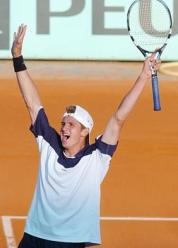 shadow of the player who won his first Grand Slam title on the same court 12 months ago. Andreev, 20 and ranked 77th in the world, had never won a Grand Slam match before the tournament but he produced a fine display of attacking tennis to knock out the clearly unfit No. 4 seed, sealing victory with an ace. Ferrero’s defeat was only the fourth time the defending men’s champion at Roland Garros has lost in the second round since the modern era began in 1968. The last was Andre Agassi in 2000. No defending champion has lost in the first round. Ferrero joined 10 American men on the sidelines. The poor U.S. performance extended to Sebastien Grosjean, who’s French but lives in Boca Raton. Grosjean, seeded 10th, was upset by Italian qualifier Potito Starace 7-6(6), 6-3, 6-4. The 22-year-old Starace [202] prior to Roland Garros’ 04 had never played a match at the main level! Second-round winners on the men’s side included top-ranked Roger Federer and three-time champion Gustavo Kuerten. They’ll meet in the third round. “I’ll have to prepare really well,” Federer said. “I’ll have to try to be more aggressive than he is without overdoing things.” Federer, 34-3 this year, is seeking his first French Open title. “I’m seeing probably the toughest guy I could play in the third round,” Kuerten said. “It’s going to be a great, great challenge.”Kuerten, seeded 28th, advanced by sweeping Gilles Elseneer 6-2, 6-0, 6-3. Federer was unhappy with his serve but still beat Nicolas Kiefer 6-3, 6-4, 7-6(6), saving a double set point in the tie-break. No. 12-seeded Lleyton Hewitt eliminated Jurgen Melzer 6-4, 6-4, 4-6, 6-2. The Australian, a two-time Grand Slam champion, has never advanced beyond the quarterfinals at Roland Garros. “I don’t think with my style of game I can totally be counted out,” Hewitt said. He’ll next play No. 19 Martin Verkerk, the runner-up last year. Verkerk hit 17 aces and won when Victor Hanescu retired with cramps trailing 4-6, 6-3, 3-6, 6-0, 3-0. No. 26 Albert Costa, the 2002 champion, defeated Christophe Rochus 6-1, 6-2, 7-5. No. 25 Ivan Ljubicic lost to Stefan Koubek 6-0, 1-6, 6-4, 6-2. With a renewed love for tennis and the help of a psychologist he has been visiting, Costa said he’s nearly back at his best. “Today I felt really good on the court, hitting the ball so good,” he said. “I made some mistakes in the third set, but I was really impressed the way I was playing with my forehand and serving sometimes.” Second seed Andy Roddick has
shadow of the player who won his first Grand Slam title on the same court 12 months ago. Andreev, 20 and ranked 77th in the world, had never won a Grand Slam match before the tournament but he produced a fine display of attacking tennis to knock out the clearly unfit No. 4 seed, sealing victory with an ace. Ferrero’s defeat was only the fourth time the defending men’s champion at Roland Garros has lost in the second round since the modern era began in 1968. The last was Andre Agassi in 2000. No defending champion has lost in the first round. Ferrero joined 10 American men on the sidelines. The poor U.S. performance extended to Sebastien Grosjean, who’s French but lives in Boca Raton. Grosjean, seeded 10th, was upset by Italian qualifier Potito Starace 7-6(6), 6-3, 6-4. The 22-year-old Starace [202] prior to Roland Garros’ 04 had never played a match at the main level! Second-round winners on the men’s side included top-ranked Roger Federer and three-time champion Gustavo Kuerten. They’ll meet in the third round. “I’ll have to prepare really well,” Federer said. “I’ll have to try to be more aggressive than he is without overdoing things.” Federer, 34-3 this year, is seeking his first French Open title. “I’m seeing probably the toughest guy I could play in the third round,” Kuerten said. “It’s going to be a great, great challenge.”Kuerten, seeded 28th, advanced by sweeping Gilles Elseneer 6-2, 6-0, 6-3. Federer was unhappy with his serve but still beat Nicolas Kiefer 6-3, 6-4, 7-6(6), saving a double set point in the tie-break. No. 12-seeded Lleyton Hewitt eliminated Jurgen Melzer 6-4, 6-4, 4-6, 6-2. The Australian, a two-time Grand Slam champion, has never advanced beyond the quarterfinals at Roland Garros. “I don’t think with my style of game I can totally be counted out,” Hewitt said. He’ll next play No. 19 Martin Verkerk, the runner-up last year. Verkerk hit 17 aces and won when Victor Hanescu retired with cramps trailing 4-6, 6-3, 3-6, 6-0, 3-0. No. 26 Albert Costa, the 2002 champion, defeated Christophe Rochus 6-1, 6-2, 7-5. No. 25 Ivan Ljubicic lost to Stefan Koubek 6-0, 1-6, 6-4, 6-2. With a renewed love for tennis and the help of a psychologist he has been visiting, Costa said he’s nearly back at his best. “Today I felt really good on the court, hitting the ball so good,” he said. “I made some mistakes in the third set, but I was really impressed the way I was playing with my forehand and serving sometimes.” Second seed Andy Roddick has 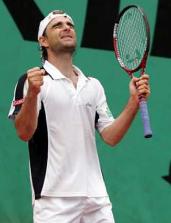 slumped out of the French Open in a shock five-set defeat by Frenchman Olivier Mutis. Mutis, the world number 125, won 3-6, 6-3, 6-7(5), 6-3, 6-2 on Court Suzanne Lenglen as the US Open champion found himself outplayed under darkening Paris skies. The 26-year-old Frenchman, who had not won a match this year prior to the tournament, mixed up his play superbly to undo 21-year-old Roddick in a see-saw encounter and sealed victory with an ace after 3 hours 11 minutes. “I started well at the beginning but I let him back in and once that happened, he was a better and different player,” said Roddick. Mutis surpassed his best Grand Slam performance by reaching the third round while the exit of Roddick, who has been suffering from a stomach upset, meant the United States has no representatives left in the men’s singles draw. Meanwhile, third seed Guillermo Coria continued his smooth progress at Roland Garros, beating fellow Argentine Juan Monaco 7-5, 6-1, 6-3 to reach the third round (Monaco’s Grand Slam debut, his 4th main-level tournament overall, Almagro’s 5th). Coria, a semifinalist here last year and one of the favorites to lift the championship, broke his opponent’s serve nine times on his way to a convincing victory in 2 hours, 23 minutes. Monaco matched Coria early on but folded once the 22-year-old had taken the first set. Coria, whose 31-match winning streak on clay was ended by Federer in the Hamburg Masters earlier this month, now plays Mario Ancic of Croatia, who shocked another Argentine, 30th seed Mariano Zabaleta, 6-3, 6-4, 3-6, 6-4. Joining Coria in the third round was 1998 champion Carlos Moya of Spain, the fifth seed, who defeated countryman Fernando Vicente 6-1, 6-2, 6-1 to record his 11th win in 11 career meetings over his fellow Spaniard. Britain’s Tim Henman showed few signs of the the mystery illness which he has complained of recently when the British No 1 moved into the third round. Henman, the
slumped out of the French Open in a shock five-set defeat by Frenchman Olivier Mutis. Mutis, the world number 125, won 3-6, 6-3, 6-7(5), 6-3, 6-2 on Court Suzanne Lenglen as the US Open champion found himself outplayed under darkening Paris skies. The 26-year-old Frenchman, who had not won a match this year prior to the tournament, mixed up his play superbly to undo 21-year-old Roddick in a see-saw encounter and sealed victory with an ace after 3 hours 11 minutes. “I started well at the beginning but I let him back in and once that happened, he was a better and different player,” said Roddick. Mutis surpassed his best Grand Slam performance by reaching the third round while the exit of Roddick, who has been suffering from a stomach upset, meant the United States has no representatives left in the men’s singles draw. Meanwhile, third seed Guillermo Coria continued his smooth progress at Roland Garros, beating fellow Argentine Juan Monaco 7-5, 6-1, 6-3 to reach the third round (Monaco’s Grand Slam debut, his 4th main-level tournament overall, Almagro’s 5th). Coria, a semifinalist here last year and one of the favorites to lift the championship, broke his opponent’s serve nine times on his way to a convincing victory in 2 hours, 23 minutes. Monaco matched Coria early on but folded once the 22-year-old had taken the first set. Coria, whose 31-match winning streak on clay was ended by Federer in the Hamburg Masters earlier this month, now plays Mario Ancic of Croatia, who shocked another Argentine, 30th seed Mariano Zabaleta, 6-3, 6-4, 3-6, 6-4. Joining Coria in the third round was 1998 champion Carlos Moya of Spain, the fifth seed, who defeated countryman Fernando Vicente 6-1, 6-2, 6-1 to record his 11th win in 11 career meetings over his fellow Spaniard. Britain’s Tim Henman showed few signs of the the mystery illness which he has complained of recently when the British No 1 moved into the third round. Henman, the  ninth seed, beat Germany’s Lars Burgsmuller 6-0, 6-3, 6-3 in just 1 hour 30 minutes. The German is ranked 82 places below the Briton but beat Henman in their previous meeting on clay three years ago. In the completion of a men’s match suspended Thursday because of darkness, former U.S. Open champion Marat Safin beat Felix Mantilla 6-4, 2-6, 6-2, 6-7(4), 11-9. Play resumed at 7-all in the 5th set, and Safin converted his first match point when Mantilla sailed a backhand long. Safin, seeded 20th, needed 24 minutes to close out his victory after playing for 4 hours and 15 minutes Thursday. He finished with 101 winners but also had 117 errors, including 40 in the final set. To celebrate a drop shot he hit for a winner, Safin grabbed his white shorts, tugged them to his thighs and leaned over, his long shirt providing cover. It appeared he wore underwear that remained in place. The crowd cheered and laughed. “Nobody complained,” Safin said. “Everybody was OK. It wasn’t like really bad.” He hitched up his pants with a smile, but it disappeared when chair umpire Carlos Bernardes penalized Safin a point. The Russian argued in vain with Bernardes and ITF supervisor Mike Morrissey, then applauded the ruling facetiously before play resumed. In the 5th set Mantilla served three times to win the match (match point he had at 6:5) having saved 7 mini-match points before (five at 1:4, two at 3:4), but every time Safin immediately broke back! Gaston Gaudio, who entered the tournament with a 1-9 record in five-setters, won his second straight 5-setter overcoming [14] Jiri Novak 2-6, 6-4, 6-4, 5-7, 6-3; in the first round Gaudio had eliminated fellow Argentine [72] Guillermo Canas 6-2, 2-6, 4-6, 6-3, 6-2 in a two-day battle (the match was suspended at two sets apiece). Both matches lasted more than 3 and 1/2 hours.
ninth seed, beat Germany’s Lars Burgsmuller 6-0, 6-3, 6-3 in just 1 hour 30 minutes. The German is ranked 82 places below the Briton but beat Henman in their previous meeting on clay three years ago. In the completion of a men’s match suspended Thursday because of darkness, former U.S. Open champion Marat Safin beat Felix Mantilla 6-4, 2-6, 6-2, 6-7(4), 11-9. Play resumed at 7-all in the 5th set, and Safin converted his first match point when Mantilla sailed a backhand long. Safin, seeded 20th, needed 24 minutes to close out his victory after playing for 4 hours and 15 minutes Thursday. He finished with 101 winners but also had 117 errors, including 40 in the final set. To celebrate a drop shot he hit for a winner, Safin grabbed his white shorts, tugged them to his thighs and leaned over, his long shirt providing cover. It appeared he wore underwear that remained in place. The crowd cheered and laughed. “Nobody complained,” Safin said. “Everybody was OK. It wasn’t like really bad.” He hitched up his pants with a smile, but it disappeared when chair umpire Carlos Bernardes penalized Safin a point. The Russian argued in vain with Bernardes and ITF supervisor Mike Morrissey, then applauded the ruling facetiously before play resumed. In the 5th set Mantilla served three times to win the match (match point he had at 6:5) having saved 7 mini-match points before (five at 1:4, two at 3:4), but every time Safin immediately broke back! Gaston Gaudio, who entered the tournament with a 1-9 record in five-setters, won his second straight 5-setter overcoming [14] Jiri Novak 2-6, 6-4, 6-4, 5-7, 6-3; in the first round Gaudio had eliminated fellow Argentine [72] Guillermo Canas 6-2, 2-6, 4-6, 6-3, 6-2 in a two-day battle (the match was suspended at two sets apiece). Both matches lasted more than 3 and 1/2 hours.
Third round: (AP)
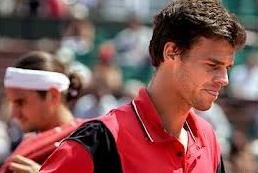 Hamburg was no mirage. Roger Federer indeed did win the title there 14 days ago, caving in a succession of some of the best clay-court players in the world. But this is the French Open. All praise to Gustavo Kuerten, the three-time winner at Roland Garros, for playing as clean a match as you’ll ever see against the No. 1 player in the world – and on the Philippe Chatrier stadium court, no less. But Federer made this 6-4, 6-4, 6-4 Saturday surprise easy for “Guga” with his inconsistent serving, his abysmal volleying and a suspect game plan that had him standing five feet behind the baseline during the first two sets, trying to win a war of attrition with a man who was sending laser shots to the corners off both sides. “Today, I required more from myself,” said Kuerten. “I couldn’t let him grow into the game, give him an opportunity.” That loss initiated Federer’s phenomenal streak of 35 consecutive Grand Slam quarterfinals (I’m writing this after his first round win during the French Open 2013). Kuerten now draws big-serving Spanish lefty Feliciano Lopez in the round of 16. Also through to the fourth round: No. 8 David Nalbandian, who took out Stefan Koubek in four sets; No. 12 Lleyton Hewitt, who came from a two-sets-to-one deficit to subdue Martin Verkerk 6-2, 3-6, 4-6, 6-2, 6-1; No. 20 Marat Safin, also down two sets to one before beating qualifier Potito Starace; and unseeded Gaston Gaudio and Igor Andreev. Safin saved two match points in the 4th set and defeated Starace 6-7(4), 6-4, 3-6, 7-5, 7-5, leaving to boos from the crowd after the match, which lasted almost 4 1/2 hours. The ire came from an incident in the 10th game of the fourth set. With Starace serving for the match at 5:4,
Hamburg was no mirage. Roger Federer indeed did win the title there 14 days ago, caving in a succession of some of the best clay-court players in the world. But this is the French Open. All praise to Gustavo Kuerten, the three-time winner at Roland Garros, for playing as clean a match as you’ll ever see against the No. 1 player in the world – and on the Philippe Chatrier stadium court, no less. But Federer made this 6-4, 6-4, 6-4 Saturday surprise easy for “Guga” with his inconsistent serving, his abysmal volleying and a suspect game plan that had him standing five feet behind the baseline during the first two sets, trying to win a war of attrition with a man who was sending laser shots to the corners off both sides. “Today, I required more from myself,” said Kuerten. “I couldn’t let him grow into the game, give him an opportunity.” That loss initiated Federer’s phenomenal streak of 35 consecutive Grand Slam quarterfinals (I’m writing this after his first round win during the French Open 2013). Kuerten now draws big-serving Spanish lefty Feliciano Lopez in the round of 16. Also through to the fourth round: No. 8 David Nalbandian, who took out Stefan Koubek in four sets; No. 12 Lleyton Hewitt, who came from a two-sets-to-one deficit to subdue Martin Verkerk 6-2, 3-6, 4-6, 6-2, 6-1; No. 20 Marat Safin, also down two sets to one before beating qualifier Potito Starace; and unseeded Gaston Gaudio and Igor Andreev. Safin saved two match points in the 4th set and defeated Starace 6-7(4), 6-4, 3-6, 7-5, 7-5, leaving to boos from the crowd after the match, which lasted almost 4 1/2 hours. The ire came from an incident in the 10th game of the fourth set. With Starace serving for the match at 5:4, 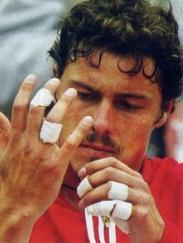 Safin called for the trainer at deuce. He had several blisters on his left hand and needed treatment. Safin even showed his hand to Starace, and he held it up to reporters in his post-match news conference. Some, including Starace, thought his timing was questionable. “Everybody could see he had blisters on his hand, but maybe he could have stopped earlier,” Starace said. No. 9 Tim Henman serving 19 aces reached the fourth round for the first time in nine appearances at Roland Garros by beating Galo Blanco 7-6(3), 6-1, 6-2. The Briton took 1 hour, 58 minutes to finally move into the final 16 on his ninth visit to Roland Garros. “In the past when I got to the third round here I was really excited that I won a couple of matches at the French,” Henman said. “But the state that my game is in now and the way I am playing I think I want much more out of it.” Elsewhere, it was a day of drubbings on the men’s side. No. 3 Guillermo Coria, No. 5 Carlos Moya and No. 17 Tommy Robredo advanced, and none lost more than seven games. Moya, the 1998 champion, won the first nine games and eliminated Raemon Sluiter 6-0, 6-3, 6-4. Coria beat Mario Ancic 6-3, 6-1, 6-2. Robredo defeated No. 11 Nicolas Massu 6-2, 6-0, 6-2. Fabrice Santoro‘s marathon run through the men’s draw ended when he lost to fellow Frenchman Olivier Mutis 6-0, 6-2, 6-3. Santoro played the longest match of the Open era in the first round, and his three matches totaled
Safin called for the trainer at deuce. He had several blisters on his left hand and needed treatment. Safin even showed his hand to Starace, and he held it up to reporters in his post-match news conference. Some, including Starace, thought his timing was questionable. “Everybody could see he had blisters on his hand, but maybe he could have stopped earlier,” Starace said. No. 9 Tim Henman serving 19 aces reached the fourth round for the first time in nine appearances at Roland Garros by beating Galo Blanco 7-6(3), 6-1, 6-2. The Briton took 1 hour, 58 minutes to finally move into the final 16 on his ninth visit to Roland Garros. “In the past when I got to the third round here I was really excited that I won a couple of matches at the French,” Henman said. “But the state that my game is in now and the way I am playing I think I want much more out of it.” Elsewhere, it was a day of drubbings on the men’s side. No. 3 Guillermo Coria, No. 5 Carlos Moya and No. 17 Tommy Robredo advanced, and none lost more than seven games. Moya, the 1998 champion, won the first nine games and eliminated Raemon Sluiter 6-0, 6-3, 6-4. Coria beat Mario Ancic 6-3, 6-1, 6-2. Robredo defeated No. 11 Nicolas Massu 6-2, 6-0, 6-2. Fabrice Santoro‘s marathon run through the men’s draw ended when he lost to fellow Frenchman Olivier Mutis 6-0, 6-2, 6-3. Santoro played the longest match of the Open era in the first round, and his three matches totaled 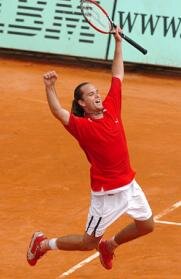 11 hours, 34 minutes (he won also in five sets his second round match). Two-time runner-up Alex Corretja lost to No. 22 Juan Ignacio Chela 6-4, 6-4, 4-6, 6-3 while Xavier Malisse outlasted 2002 French Open champion Albert Costa of Spain in a two-day battle 6-4, 2-6, 4-6, 7-6(4), 8-6. Malisse saved two match points at *4:5 in the 5th set, and the match was suspended due to darkness at 5-all. The Belgian player said about the last game before the suspension: “I was with the wind and I felt the past couple of games I hadn’t really attacked. But I think I played four unbelievable points. I hit four winners. I went for it. And once it’s 5-all, you feel great. You’re supposed to be in the locker room, a loser, but you’re still there, trying to battle.” At the peak of his performance in the fifth set, Malisse hit so many lines that Costa, who is normally very calm, screamed toward the audience in Spanish about how lucky Malisse was. And when he failed to hold serve at 6-all, Costa slammed his racket into the clay, incurring a warning. Gaston Gaudio after two consecutive five-setters, this time needed “only” four sets to dismiss Swedish veteran [65] Thomas Enqvist 6-0, 6-4, 6-7(5), 6-4.
11 hours, 34 minutes (he won also in five sets his second round match). Two-time runner-up Alex Corretja lost to No. 22 Juan Ignacio Chela 6-4, 6-4, 4-6, 6-3 while Xavier Malisse outlasted 2002 French Open champion Albert Costa of Spain in a two-day battle 6-4, 2-6, 4-6, 7-6(4), 8-6. Malisse saved two match points at *4:5 in the 5th set, and the match was suspended due to darkness at 5-all. The Belgian player said about the last game before the suspension: “I was with the wind and I felt the past couple of games I hadn’t really attacked. But I think I played four unbelievable points. I hit four winners. I went for it. And once it’s 5-all, you feel great. You’re supposed to be in the locker room, a loser, but you’re still there, trying to battle.” At the peak of his performance in the fifth set, Malisse hit so many lines that Costa, who is normally very calm, screamed toward the audience in Spanish about how lucky Malisse was. And when he failed to hold serve at 6-all, Costa slammed his racket into the clay, incurring a warning. Gaston Gaudio after two consecutive five-setters, this time needed “only” four sets to dismiss Swedish veteran [65] Thomas Enqvist 6-0, 6-4, 6-7(5), 6-4.
Fourth round: Steven Wine
With the red clay he loves caked on his shirt and shorts, Gustavo Kuerten moved one round closer to his fourth French Open title Monday. Kuerten took a hard spill in the final game but was unhurt, and five points later he completed a 6-3, 7-5, 6-4 victory over Feliciano Lopez for a berth in the quarterfinals. ”Look at me,” Kuerten said, smiling and filthy moments after the match. ‘‘This never happened to me in my life. I’m all dirty.” Dominating with his serve and facing only one break point, Kuerten needed less than two hours to complete the fourth-round victory. Marat Safin‘s wild run at Roland Garros ended when he lost to No. 8-seeded David Nalbandian 7-5, 6-4, 6-7(5), 6-3. Safin played with tape on both hands to cover at least eight blisters that developed during a five-set victory in the third round. The 20th-seeded Russian required treatment from a trainer at 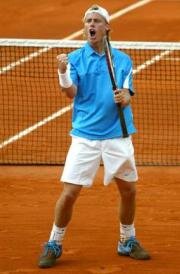 least seven times, including once in the middle of a game. Nalbandian is one of four Argentines in the men’s quarterfinals, a Grand Slam record. He joined compatriots Gaston Gaudio, Guillermo Coria and Juan Ignacio Chela in the final eight and will play fellow South American Kuerten on Wednesday. No. 12-seeded Lleyton Hewitt reached the Roland Garros quarterfinals for the second time when he beat Xavier Malisse 7-5, 6-2, 7-6(6). Hewitt’s next opponent will be unseeded Gaudio, who beat Igor Andreev 6-4, 7-5, 6-3. Andreev upset defending champion Juan Carlos Ferrero in the second round. Kuerten arrived in Paris seeded just 28th and hampered by a sore right hip that required surgery in 2002. But Roland Garros brings out his best, and he upset top-ranked Roger Federer in straight sets in the third round. The Brazilian’s latest victory was just as efficient. ”I never expected this to happen,” said Kuerten, fighting back tears. ”I’m very emotional right now.” He twice requested massage treatment from a trainer but moved well throughout the match, sliding across the clay with his customary grace. Hewitt overcome five set points in the 3rd set against Malisse. The Belgian led 6:3 in the tiebreaker but made three consecutive errors, then sailed a backhand long on the final point. ”I just tried hanging in there and not giving him any cheap points,” Hewitt said. ”In the end, it paid off.” Malisse was bothered by back trouble early and received a massage from a trainer after the first. Gaudio, 25, earned his first Grand Slam quarterfinal berth by converting nine of 11 break-point chances. Andreev, an unseeded Russian, lost by committing 65 unforced errors. ”Anyways, good tournament,” he said. Tim Henman says he will stop shaving as long as he stays in the French Open. He nearly broke that vow Sunday. Henman rallied from two sets down and saved match point before beating Michael Llodra 6-7(2), 4-6, 6-4, 6-3, 9-7 to advance to the quarterfinals. “I haven’t been shaving the whole clay-court
least seven times, including once in the middle of a game. Nalbandian is one of four Argentines in the men’s quarterfinals, a Grand Slam record. He joined compatriots Gaston Gaudio, Guillermo Coria and Juan Ignacio Chela in the final eight and will play fellow South American Kuerten on Wednesday. No. 12-seeded Lleyton Hewitt reached the Roland Garros quarterfinals for the second time when he beat Xavier Malisse 7-5, 6-2, 7-6(6). Hewitt’s next opponent will be unseeded Gaudio, who beat Igor Andreev 6-4, 7-5, 6-3. Andreev upset defending champion Juan Carlos Ferrero in the second round. Kuerten arrived in Paris seeded just 28th and hampered by a sore right hip that required surgery in 2002. But Roland Garros brings out his best, and he upset top-ranked Roger Federer in straight sets in the third round. The Brazilian’s latest victory was just as efficient. ”I never expected this to happen,” said Kuerten, fighting back tears. ”I’m very emotional right now.” He twice requested massage treatment from a trainer but moved well throughout the match, sliding across the clay with his customary grace. Hewitt overcome five set points in the 3rd set against Malisse. The Belgian led 6:3 in the tiebreaker but made three consecutive errors, then sailed a backhand long on the final point. ”I just tried hanging in there and not giving him any cheap points,” Hewitt said. ”In the end, it paid off.” Malisse was bothered by back trouble early and received a massage from a trainer after the first. Gaudio, 25, earned his first Grand Slam quarterfinal berth by converting nine of 11 break-point chances. Andreev, an unseeded Russian, lost by committing 65 unforced errors. ”Anyways, good tournament,” he said. Tim Henman says he will stop shaving as long as he stays in the French Open. He nearly broke that vow Sunday. Henman rallied from two sets down and saved match point before beating Michael Llodra 6-7(2), 4-6, 6-4, 6-3, 9-7 to advance to the quarterfinals. “I haven’t been shaving the whole clay-court 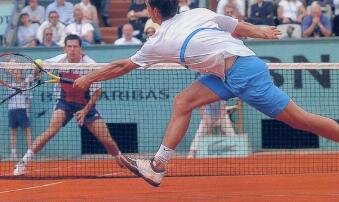 season,” joked ninth-seeded Henman, known for his boyish face. “The hair’s finally coming through.” Whether or not the facial hair has brought luck, Henman stands one win away from becoming the most successful British player at Roland Garros in Open era history. If he beats Argentina’s Juan Ignacio Chela in the quarters, Henman will become the only Briton to reach the Roland Garros semifinals since the Open era began in 1968. “For 1 hour, 49 minutes, I played the wrong way,” Henman said. “To find a way to come through that is character building. I take a lot of positives from the mental strength I showed.” Llodra, a two-time Grand Slam doubles champion, had some impressive moments. With Henman serving at 2:1 in the decisive set, Llodra retrieved two smashes. The first was brilliant, the second – with Llodra stretching backward and volleying a passing shot down the line – bordered on miraculous. “It was a one-in-a-million shot,” Henman said. Down 4:5, Henman double-faulted three times but saved match point with a bold pass down the line and then held the next three service games to love. Chela, the No. 22 seed, advanced to a Grand Slam quarter for the first time, beating Olivier Mutis of France 4-6, 6-2, 7-6(5), 6-2. In other men’s play Sunday, No. 3 Guillermo Coria and No. 5 Carlos Moya also won. Coria led 6-0 before Nicolas Escude retired, citing tendinitis in his right shoulder. Escude said tendinitis in his shoulder worsened after his last match. “I put a heat pack on to try to heat it up and was playing with that on,’‘ he said. “But each serve was really painful. There was no point in going on.” The 28-year-old Escude played just one tournament afterwards before retirement… Moya ousted his compatriot Tommy Robredo 7-6(8), 6-4, 6-2. Moya had already two set points leading 5:2* in the opening set, then led 6:3 in the tie-break, but Robredo had two set points as well, *7:6 & 8:7.
season,” joked ninth-seeded Henman, known for his boyish face. “The hair’s finally coming through.” Whether or not the facial hair has brought luck, Henman stands one win away from becoming the most successful British player at Roland Garros in Open era history. If he beats Argentina’s Juan Ignacio Chela in the quarters, Henman will become the only Briton to reach the Roland Garros semifinals since the Open era began in 1968. “For 1 hour, 49 minutes, I played the wrong way,” Henman said. “To find a way to come through that is character building. I take a lot of positives from the mental strength I showed.” Llodra, a two-time Grand Slam doubles champion, had some impressive moments. With Henman serving at 2:1 in the decisive set, Llodra retrieved two smashes. The first was brilliant, the second – with Llodra stretching backward and volleying a passing shot down the line – bordered on miraculous. “It was a one-in-a-million shot,” Henman said. Down 4:5, Henman double-faulted three times but saved match point with a bold pass down the line and then held the next three service games to love. Chela, the No. 22 seed, advanced to a Grand Slam quarter for the first time, beating Olivier Mutis of France 4-6, 6-2, 7-6(5), 6-2. In other men’s play Sunday, No. 3 Guillermo Coria and No. 5 Carlos Moya also won. Coria led 6-0 before Nicolas Escude retired, citing tendinitis in his right shoulder. Escude said tendinitis in his shoulder worsened after his last match. “I put a heat pack on to try to heat it up and was playing with that on,’‘ he said. “But each serve was really painful. There was no point in going on.” The 28-year-old Escude played just one tournament afterwards before retirement… Moya ousted his compatriot Tommy Robredo 7-6(8), 6-4, 6-2. Moya had already two set points leading 5:2* in the opening set, then led 6:3 in the tie-break, but Robredo had two set points as well, *7:6 & 8:7.
Quarterfinals: (AP)
Gustavo Kuerten‘s love affair with Roland Garros turned sour on Wednesday as the three-time champion was upended in the quarterfinals by Argentina’s David Nalbandian. Kuerten has led a charmed life at the French Open since his unlikely run to the first of his trio of titles in 1997, but his luck deserted him on Centre Court as he fell 6-2, 3-6, 6-4, 7-6(6). The Brazilian’s samba style was silenced. Instead the Centre Court pulsed to the tune of the tango. Nalbandian joins compatriots Gaston Gaudio and Guillermo Coria in the last four – the first time there have been three Argentine semifinalists at a Grand Slam tournament. Briton Tim Henman completes the line-up. “It’s truly unbelievable,” Nalbandian said. Former world number one Kuerten had never lost to a fellow South American in a Grand Slam tournament but Nalbandian proved too solid from the baseline. Kuerten failed to convert four set points in the 4th set, squandered a 5:2 lead in the tiebreaker and sailed a forehand long on match point. “Everybody knows what it means to me to play in this tournament,” Kuerten said as he left the court. “I had a tough time today. He made me run a lot and I really suffered.” In the day’s other quarterfinal, Lleyton Hewitt found that unflinching determination and bottomless heart were insufficient as his claycourt failings were exploited by 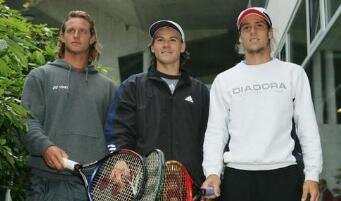 Gaudio. The resolve on which the Australian has built his career was of little use against an Argentine master who ran rings round him on Centre Court to reach the semifinals 6-3, 6-2, 6-2. “He was too good,” was Hewitt’s candid analysis. “Today I just lost to a guy that was too good. You know, he’s very good at any time, but especially today he was able to get that ball back extremely deep, so he didn’t give me a lot of chances to actually attack him out there today. He’s a class player on this surface.” Gaudio won 11 consecutive points early in the 2nd set to take control and needed less than two hours to complete the victory. He improved his career record in major events to 20-20 For Gaudio, ranked 44th in the world, victory over the former Wimbledon and US Open champion propelled him into his first Grand Slam semifinal. “It has always been my dream to win this tournament,” the 25-year-old said. “But there is a long way to go yet because the two most difficult matches are yet to come.” Two weeks earlier they met in Dusseldorf and Gaudio prevailed after very dramatic encounter. While Coria is the tournament favourite, Henman is a fast-court player with four Wimbledon semifinals behind him. He had never
Gaudio. The resolve on which the Australian has built his career was of little use against an Argentine master who ran rings round him on Centre Court to reach the semifinals 6-3, 6-2, 6-2. “He was too good,” was Hewitt’s candid analysis. “Today I just lost to a guy that was too good. You know, he’s very good at any time, but especially today he was able to get that ball back extremely deep, so he didn’t give me a lot of chances to actually attack him out there today. He’s a class player on this surface.” Gaudio won 11 consecutive points early in the 2nd set to take control and needed less than two hours to complete the victory. He improved his career record in major events to 20-20 For Gaudio, ranked 44th in the world, victory over the former Wimbledon and US Open champion propelled him into his first Grand Slam semifinal. “It has always been my dream to win this tournament,” the 25-year-old said. “But there is a long way to go yet because the two most difficult matches are yet to come.” Two weeks earlier they met in Dusseldorf and Gaudio prevailed after very dramatic encounter. While Coria is the tournament favourite, Henman is a fast-court player with four Wimbledon semifinals behind him. He had never 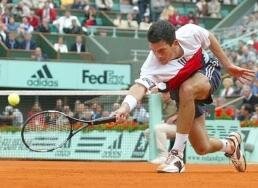 progressed beyond the fourth round of any Grand Slam tournament outside of Wimbledon, and had never won more than two matches in any of his nine previous visits here. Henman sparkled as Tuesday’s daylight faded with a 6-2, 6-4, 6-4 victory over Argentine claycourter Juan Ignacio Chela. His victory was as impressive as it was unexpected, coming as it did on his least favourite surface. “I’ll settle for that,” Henman smiled. “I think, again as I’ve been banging on about for some time, it’s about trying to play the right way. I really imposed my game from the start and never let him get into a rhythm. But why stop here? I feel good about my game and I am feeling in good shape. I’m ready to come here on Friday and do it all again.” Coria, the best clay courter so far this year, will be a huge mountain to climb. The third seed beat Spanish former champion Carlos Moya 7-5, 7-6(3), 6-3. “Coria is a great player who always seems to know where the ball is going but I had chances,” said Moya, who was unable to take his chances, failing to close out when serving for both of the first two sets.
progressed beyond the fourth round of any Grand Slam tournament outside of Wimbledon, and had never won more than two matches in any of his nine previous visits here. Henman sparkled as Tuesday’s daylight faded with a 6-2, 6-4, 6-4 victory over Argentine claycourter Juan Ignacio Chela. His victory was as impressive as it was unexpected, coming as it did on his least favourite surface. “I’ll settle for that,” Henman smiled. “I think, again as I’ve been banging on about for some time, it’s about trying to play the right way. I really imposed my game from the start and never let him get into a rhythm. But why stop here? I feel good about my game and I am feeling in good shape. I’m ready to come here on Friday and do it all again.” Coria, the best clay courter so far this year, will be a huge mountain to climb. The third seed beat Spanish former champion Carlos Moya 7-5, 7-6(3), 6-3. “Coria is a great player who always seems to know where the ball is going but I had chances,” said Moya, who was unable to take his chances, failing to close out when serving for both of the first two sets.
Semifinals: Steven Wine
Guillermo Coria swept 13 games in a row, then withstood Tim Henman‘s comeback bid to win 3-6, 6-4, 6-0, 7-5 Friday at the French Open, setting up the first all-Argentine Grand Slam final. No. 3-seeded Coria’s opponent Sunday will be unseeded Gaston Gaudio, who lost track of the score in the second set but knew when to celebrate after beating yet another Argentine, No. 8 David Nalbandian, 6-3, 7-6(5), 6-0. The last Argentine to reach the men’s final at the French Open was 1982 runner-up Guillermo Vilas, who watched from the third row as Coria and Gaudio advanced to their first Grand Slam final. “I never thought I was going to be in the final of such a big tournament like this,” Gaudio said. He or Coria will become the first Argentine to win a major men’s title since Vilas at the 1979 Australian Open. “There will be a lot of emotion on Sunday,” Vilas said. “It’s normal, no?” Coria, who is named after Vilas, took a 3:0* lead in the final set of the seesaw semifinal before Henman rallied to win five consecutive games. Coria then regrouped to sweep the 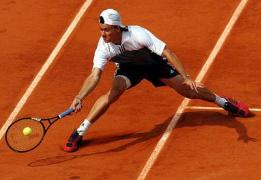 final four games, closing out the victory when Henman floated a backhand long. “I’ve dreamed of getting to this very Sunday,” Coria said. “It will be a historic moment. Most important is that Argentina is going to win.” No. 9-seeded Henman, the first Englishman in 41 years to reach the semifinals at Roland Garros, made his run with a serve-and-volley game that’s usually ineffective on clay. The tactic finally backfired against Coria. “I started off the match well, but a difficult period in the middle, and still had chances in the end,” Henman said. “That’s the way it goes. That’s sport.” The speedy, combative Argentine was on the defensive early, and he received a code violation for angrily breaking his racket after falling behind 5:3. The opening set was the first he has lost in the tournament. Henman continued to apply pressure until he led 4:2 in the 2nd set, when the match suddenly turned. Coria began to hit his passing shots more precisely, Henman became more erratic, and soon the Englishman was having a hard time winning a point, much less a game. “I saw he was a little bit lost,” Coria said. “That’s what gave me strength to continue to fight.” Coria kept making his opponent hit one more shot. On one exchange, he raced into the corner, then up to the net, then retreated to hit an acrobatic overhead for a winner. “Vamos!” he shouted. Henman made one last charge, overtook Coria in the fourth set and served with a chance to force a fifth. But Coria broke, then broke again for the ninth time to secure the victory. The Argentine has won 37 of his past 38 clay-court matches. “For a set and a half, and toward the end of the fourth set,” Henman said, “playing the best clay-court player in the world, I made him look pretty ordinary.” Gaudio rallied from a 5:1* deficit in the 2nd set, winning five consecutive games and overcoming two set points. Confusion about the score came with Gaudio serving at 5:2 in the tiebreaker. He erroneously served from the deuce side of the court, and neither Nalbandian nor chair umpire Andreas Egli noticed the mistake until after the point, which Gaudio won for a 6:2 lead. The point
final four games, closing out the victory when Henman floated a backhand long. “I’ve dreamed of getting to this very Sunday,” Coria said. “It will be a historic moment. Most important is that Argentina is going to win.” No. 9-seeded Henman, the first Englishman in 41 years to reach the semifinals at Roland Garros, made his run with a serve-and-volley game that’s usually ineffective on clay. The tactic finally backfired against Coria. “I started off the match well, but a difficult period in the middle, and still had chances in the end,” Henman said. “That’s the way it goes. That’s sport.” The speedy, combative Argentine was on the defensive early, and he received a code violation for angrily breaking his racket after falling behind 5:3. The opening set was the first he has lost in the tournament. Henman continued to apply pressure until he led 4:2 in the 2nd set, when the match suddenly turned. Coria began to hit his passing shots more precisely, Henman became more erratic, and soon the Englishman was having a hard time winning a point, much less a game. “I saw he was a little bit lost,” Coria said. “That’s what gave me strength to continue to fight.” Coria kept making his opponent hit one more shot. On one exchange, he raced into the corner, then up to the net, then retreated to hit an acrobatic overhead for a winner. “Vamos!” he shouted. Henman made one last charge, overtook Coria in the fourth set and served with a chance to force a fifth. But Coria broke, then broke again for the ninth time to secure the victory. The Argentine has won 37 of his past 38 clay-court matches. “For a set and a half, and toward the end of the fourth set,” Henman said, “playing the best clay-court player in the world, I made him look pretty ordinary.” Gaudio rallied from a 5:1* deficit in the 2nd set, winning five consecutive games and overcoming two set points. Confusion about the score came with Gaudio serving at 5:2 in the tiebreaker. He erroneously served from the deuce side of the court, and neither Nalbandian nor chair umpire Andreas Egli noticed the mistake until after the point, which Gaudio won for a 6:2 lead. The point 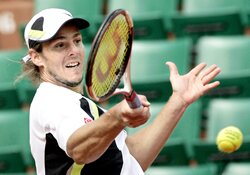 counted, and Egli told Gaudio to serve again from the deuce side. Nalbandian, frustrated that the set was slipping away, briefly argued. “So now he’s going to serve two points to the same side?” Nalbandian said. “Maybe you have to change to another umpire.” Gaudio was amused by his mistake. “I made history,” he said. “It’s the first time something like that happened in the French Open.” With the situation resolved, Nalbandian overcame three consecutive set points to reach 6:5, but Gaudio then closed out the set with an overhead slam. From there, Nalbandian unraveled, struggling to keep the ball in the court. He won only seven points in the final set, and on the last point he dumped a forehand into the net, his 46th unforced error. Nalbandian said he hurt his ribs in the quarterfinals and was hampered by the injury, especially when serving. “Sometimes you’re not feeling so good and you can’t win any matches,” he said. Regarding the confusion about the score in the tiebreaker, Nalbandian faulted Egli. “He did a very big mistake, like both of us,” Nalbandian said. “The umpire has to be concentrating on the game. I think that kind of mistake is so big, they have to have a fine or something.”
counted, and Egli told Gaudio to serve again from the deuce side. Nalbandian, frustrated that the set was slipping away, briefly argued. “So now he’s going to serve two points to the same side?” Nalbandian said. “Maybe you have to change to another umpire.” Gaudio was amused by his mistake. “I made history,” he said. “It’s the first time something like that happened in the French Open.” With the situation resolved, Nalbandian overcame three consecutive set points to reach 6:5, but Gaudio then closed out the set with an overhead slam. From there, Nalbandian unraveled, struggling to keep the ball in the court. He won only seven points in the final set, and on the last point he dumped a forehand into the net, his 46th unforced error. Nalbandian said he hurt his ribs in the quarterfinals and was hampered by the injury, especially when serving. “Sometimes you’re not feeling so good and you can’t win any matches,” he said. Regarding the confusion about the score in the tiebreaker, Nalbandian faulted Egli. “He did a very big mistake, like both of us,” Nalbandian said. “The umpire has to be concentrating on the game. I think that kind of mistake is so big, they have to have a fine or something.”
Final: Douglas Robson
In a tournament with more layers of twists and turns than an oven-fresh croissant, none was more unpredictable than the men’s final at the French Open on Sunday. Playing flawless clay-court tennis and leading by two sets to none, No. 3 seed Guillermo Coria of Argentina suddenly cramped up midway through the 3rd set against countryman Gaston Gaudio. Coria dropped the set, and a few games later could only move a few feet laterally while lobbing in 60-mph first serves. But by the start of the 5th set, Coria’s cramps eased, and though hobbled, he fought his way to two match points at 6:5 against a befuddled Gaudio. But the unseeded – and unheralded – Gaudio held on, ripping one of his picturesque cross-court backhands at match point to seal his Cinderella run in the first all-Argentine final 0-6, 3-6, 6-4, 6-1, 8-6. 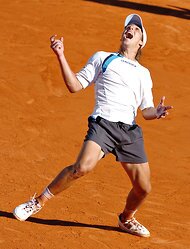 “I don’t know how, but I won,” said an incredulous Gaudio, who came into the tournament ranked No. 44 and had never before gone beyond the fourth round of a major. The 25-year-old’s win gave Argentina its first men’s Grand Slam champion in 25 years. The last was Guillermo Vilas, who mentored both finalists as youths (Coria is named after him). “I never saw anything like that in a tennis match,” said Vilas, who watched from the stands. “I hope to be back next year and take my revenge,” Coria said. “He made me move. He made me play, and I was exhausted. But I’m happy because I gave everything I had.” Coria lost for only the second time in his past 39 clay-court matches. He won 18 of 19 sets in the tournament before losing the last two. “He was playing unbelievable here during these two weeks,” Gaudio said. “For sure he’s going to get it next year.” In 2005 Coria was ousted already in the fourth round and it virtually ended his two-year supremacy on clay-courts. Gaudio’s ranking was the fourth lowest for a Grand Slam men’s champion in the Open era. The only other unseeded Roland Garros men’s champs in the Open era were Mats Wilander in 1982 and Gustavo Kuerten in 1997. Gaudio is the first man from Argentina to claim a major title since Vilas won the last of his four Grand Slam championships at the 1979 Australian Open. Vilas watched the final from the VIP section behind the baseline, then participated in the trophy ceremony and gave Gaudio a hug. On a sunny, 78-degree afternoon (25 Celsius), Coria was as brilliant as the weather at the start. He left skid marks all over the clay and performed the sort of tricks with his racket that have earned him the nickname “El Mago”. Singing, chanting Argentine fans began arriving at Roland Garros 2.50 hours before the start. By the ninth game the rest of the crowd was with them, roaring whenever Gaudio managed to win a point, rooting for a competitive match. He needed 36 minutes to win a game, then 17 minutes to win another. By then he trailed 5:2 in the 2nd set, and after losing the set, Gaudio stomped off the court and threw his racket against his chair. With Coria two games from victory at 4:3 in the 3rd set, a wave by the crowd delayed play for more than a minute. Gaudio, waiting to serve, put down his racket and ball, grinned and
“I don’t know how, but I won,” said an incredulous Gaudio, who came into the tournament ranked No. 44 and had never before gone beyond the fourth round of a major. The 25-year-old’s win gave Argentina its first men’s Grand Slam champion in 25 years. The last was Guillermo Vilas, who mentored both finalists as youths (Coria is named after him). “I never saw anything like that in a tennis match,” said Vilas, who watched from the stands. “I hope to be back next year and take my revenge,” Coria said. “He made me move. He made me play, and I was exhausted. But I’m happy because I gave everything I had.” Coria lost for only the second time in his past 39 clay-court matches. He won 18 of 19 sets in the tournament before losing the last two. “He was playing unbelievable here during these two weeks,” Gaudio said. “For sure he’s going to get it next year.” In 2005 Coria was ousted already in the fourth round and it virtually ended his two-year supremacy on clay-courts. Gaudio’s ranking was the fourth lowest for a Grand Slam men’s champion in the Open era. The only other unseeded Roland Garros men’s champs in the Open era were Mats Wilander in 1982 and Gustavo Kuerten in 1997. Gaudio is the first man from Argentina to claim a major title since Vilas won the last of his four Grand Slam championships at the 1979 Australian Open. Vilas watched the final from the VIP section behind the baseline, then participated in the trophy ceremony and gave Gaudio a hug. On a sunny, 78-degree afternoon (25 Celsius), Coria was as brilliant as the weather at the start. He left skid marks all over the clay and performed the sort of tricks with his racket that have earned him the nickname “El Mago”. Singing, chanting Argentine fans began arriving at Roland Garros 2.50 hours before the start. By the ninth game the rest of the crowd was with them, roaring whenever Gaudio managed to win a point, rooting for a competitive match. He needed 36 minutes to win a game, then 17 minutes to win another. By then he trailed 5:2 in the 2nd set, and after losing the set, Gaudio stomped off the court and threw his racket against his chair. With Coria two games from victory at 4:3 in the 3rd set, a wave by the crowd delayed play for more than a minute. Gaudio, waiting to serve, put down his racket and ball, grinned and 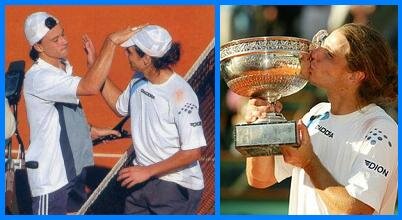 applauded the scene. “I was too nervous,” Gaudio said. “After the wave, the people started to help me, and I relaxed a little bit.” He swept the final eight points of the set, and the drama unfolded from there. “I want to congratulate Gaston, he’s had some problems and come through them,” said Coria. “I’ll be back next year.” Gaudio, who was 1-9 in five-set matches before Roland Garros but prevailed in three on his way to the title, shed tears of joy during the trophy presentation. And the physically and emotionally broken Coria, 22, wept when the subject of his doping suspension in 2001 came up. Gaudio’s 3rd title (he had not won a title more than two years entering the event)! The Parisian final marked his 9th victory in a row (he came to Paris having won two matches at the World Team Cup in Düsseldorf). The streak ended at 13 in the Bastad final (lost to Mariano Zabaleta).
applauded the scene. “I was too nervous,” Gaudio said. “After the wave, the people started to help me, and I relaxed a little bit.” He swept the final eight points of the set, and the drama unfolded from there. “I want to congratulate Gaston, he’s had some problems and come through them,” said Coria. “I’ll be back next year.” Gaudio, who was 1-9 in five-set matches before Roland Garros but prevailed in three on his way to the title, shed tears of joy during the trophy presentation. And the physically and emotionally broken Coria, 22, wept when the subject of his doping suspension in 2001 came up. Gaudio’s 3rd title (he had not won a title more than two years entering the event)! The Parisian final marked his 9th victory in a row (he came to Paris having won two matches at the World Team Cup in Düsseldorf). The streak ended at 13 in the Bastad final (lost to Mariano Zabaleta).
***********************************
French Open, Paris
May 23-June 7, 2005; 128 Draw (32 seeds); Surface – Clay
All eyes were on Rafael Nadal, the 18-year-old muscular Spaniard, who had missed two previous editions due to injuries, in 2005 was fit and displaying a top form (triumphed in Monte Carlo and Rome prior to Paris). Nevertheless “I am not the favorite” he insisted at the start of the tournament. During press conferences he was modest, but on court very eager to show different behavior – he was amazingly self-confident and merciless for opponents. Only Mariano Puerta in the final threatened him seriously. Puerta rose like a phoenix from the ashes after a nine-month suspension because of taking an illegal substance. Unfortunately he was a habitual offender and was once again banned at the end of 2005, this time after it was revealed that he had tested positive for the use of the cardiac stimulant, etilefrine – he was forced to forfeit all his rankings points and prize money from the 2005 French Open onwards…. First Roland Garros without net-judges, they were erased in other Grand Slam events already in the 90s.
First round: Charles Bricker
Midway through the fifth set, pain shooting down his leg, Andre Agassi‘s usual pigeon-toed Charlie Brown speed-walk between points had slowed to something closer to a shuffle. It was evident to everyone in the house, including Agassi himself, that he was going down – run into submission and suffering by qualifier Jarkko Nieminen, one of the fastest players in tennis and perhaps the last 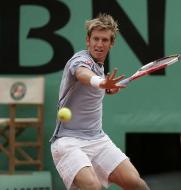 man to face Agassi at the French Open. If this stunning 7-5, 4-6, 6-7(6), 6-1, 6-0 loss in the opening round was Agassi’s final trip to the red clay of Paris, it wasn’t accompanied by his trademark blown kisses to the 14,000 packed into the Philippe Chatrier court. He packed his bag, slung it over his shoulder, sportingly waited for Nieminen to finish his several rounds of waves, then exited the court with him, his head down and his spirits as low as they’ve been in a long time. For the last two sets, Agassi looked 35, which is what he is. He’s a man who outwardly looks physically fit – solid enough to reach the quarterfinals of the Australian Open and the semifinals at Key Biscayne and Rome. But, he revealed, he has sciatica, and the late-February cortisone shot he took for the inflamed nerve in his back has just about worn off. “You know, it’s bad. It’s something that needs to be addressed because I can’t be out there like that,” he said. “I mean, I literally hurt.” Agassi, the oldest player in the tournament at 35, said the injury flared up in the third set (still managed to win it saving a set point in the tie-break). ”To serve was painful, to move, to stand and even to sit,’‘ he said. ‘‘It was getting worse and worse.” Agassi said a cortisone injection in February alleviated the symptoms for a while, but his back began to bother him again about a month ago. It’s the sort of chronic injury that could drive him into retirement, but he said he hopes to play next month at Wimbledon, although he may need more cortisone. ”Something tells me I’m at the stage of my career where I’m going to be living with these injections,” he said. Three-time winner Gustavo Kuerten [94] lost to David Sanchez 6-3, 6-0, 4-6, 6-1. Plagued for years by hip trouble, the Brazilian has won just two matches in 2005. ”Everyone is getting older – me, you, Agassi, everyone,” said Kuerten, 28. Like Agassi, Kuerten said he’s not ready for retirement. ”I want to try more and maybe be successful again, especially in this tournament,” he said. ”I feel like I have the capacity to feel as strong as before.” Roger Federer hardly knew anything about qualifier Dudi Sela before playing him Monday in the first round of the French Open. That didn’t stop the top-ranked Swiss from winning 6-1, 6-4, 6-0. Federer said his scouting report on Sela was limited to just “half an hour before the match.” “I warmed up next to him on the same court. That’s it. I warmed up with my friend and he warmed up with his friend,” Federer said. “I hadn’t heard anything about him. So I think you can relax a little bit because he’s not supposed to break through in this tournament. If you play tough, you know you should get through. Once I win a set 6-1, I’m not usually going to lose a match.” Federer also knows nothing about his next opponent Nicolas Almagro, who beat Philipp Kohlschreiber 7-6(4), 6-4, 6-3 – but he does believe his game needs improving. Marat Safin stares at his hands a lot, praying he
man to face Agassi at the French Open. If this stunning 7-5, 4-6, 6-7(6), 6-1, 6-0 loss in the opening round was Agassi’s final trip to the red clay of Paris, it wasn’t accompanied by his trademark blown kisses to the 14,000 packed into the Philippe Chatrier court. He packed his bag, slung it over his shoulder, sportingly waited for Nieminen to finish his several rounds of waves, then exited the court with him, his head down and his spirits as low as they’ve been in a long time. For the last two sets, Agassi looked 35, which is what he is. He’s a man who outwardly looks physically fit – solid enough to reach the quarterfinals of the Australian Open and the semifinals at Key Biscayne and Rome. But, he revealed, he has sciatica, and the late-February cortisone shot he took for the inflamed nerve in his back has just about worn off. “You know, it’s bad. It’s something that needs to be addressed because I can’t be out there like that,” he said. “I mean, I literally hurt.” Agassi, the oldest player in the tournament at 35, said the injury flared up in the third set (still managed to win it saving a set point in the tie-break). ”To serve was painful, to move, to stand and even to sit,’‘ he said. ‘‘It was getting worse and worse.” Agassi said a cortisone injection in February alleviated the symptoms for a while, but his back began to bother him again about a month ago. It’s the sort of chronic injury that could drive him into retirement, but he said he hopes to play next month at Wimbledon, although he may need more cortisone. ”Something tells me I’m at the stage of my career where I’m going to be living with these injections,” he said. Three-time winner Gustavo Kuerten [94] lost to David Sanchez 6-3, 6-0, 4-6, 6-1. Plagued for years by hip trouble, the Brazilian has won just two matches in 2005. ”Everyone is getting older – me, you, Agassi, everyone,” said Kuerten, 28. Like Agassi, Kuerten said he’s not ready for retirement. ”I want to try more and maybe be successful again, especially in this tournament,” he said. ”I feel like I have the capacity to feel as strong as before.” Roger Federer hardly knew anything about qualifier Dudi Sela before playing him Monday in the first round of the French Open. That didn’t stop the top-ranked Swiss from winning 6-1, 6-4, 6-0. Federer said his scouting report on Sela was limited to just “half an hour before the match.” “I warmed up next to him on the same court. That’s it. I warmed up with my friend and he warmed up with his friend,” Federer said. “I hadn’t heard anything about him. So I think you can relax a little bit because he’s not supposed to break through in this tournament. If you play tough, you know you should get through. Once I win a set 6-1, I’m not usually going to lose a match.” Federer also knows nothing about his next opponent Nicolas Almagro, who beat Philipp Kohlschreiber 7-6(4), 6-4, 6-3 – but he does believe his game needs improving. Marat Safin stares at his hands a lot, praying he 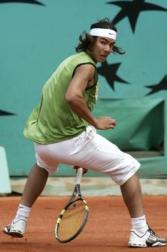 won’t spot another blister. Little is more troublesome to a power hitting player than pain from gripping the racket, something Safin knows well after getting blisters on both hands at last year’s French Open. Just the thought of it is alarming. “I’m scared, actually,” Safin said after his 6-1, 4-6, 6-4, 6-2 first-round win over Raemon Sluiter. “I have no idea where they came from. I am praying they will not come back again.” On Court No. 1, 18-year-old Rafael Nadal, hoping to be the first man in 23 years to win the title on his debut, saw off Germany’s Lars Burgsmuller 6-1, 7-6(4), 6-1. Argentine Gaston Gaudio made a comfortable start to his title defense by beating Frenchman Julien Benneteau 7-5, 6-0, 6-1. The 26-year-old Gaudio, seeded fifth, needed time to get going but then dominated his unheralded opponent to win in just over two hours. “I was very nervous at first because there’s so much pressure on me and the expectations are so high,” said Gaudio, who beat Guillermo Coria last year in the first all-Argentine final in Grand Slam history. Nadal showed no signs of first day nerves against the journeyman Burgsmuller, winning in 1 hour 45 minutes to set up a second round clash against Belgium’s Xavier Malisse. “It’s not the best match I’ve played in recent times… because of course I was a little nervous as I was playing here for the first time,” said Nadal, who won the Monte Carlo and Rome Masters crowns in the run-up to the French Open. “It was a great atmosphere, I am happy because it’s my first French Open and there were a lot of people on court to see me. I want to play my best tennis here but it’s not easy.” The muscular fourth seed, playing in his now customary three-quarter length trousers, was forced to miss the 2003 French Open because of an elbow injury and had to sit out the 2004 event due to a stress fracture in his left ankle. He has spent the spring constantly playing down talk of being the favorite here despite clinching five clay court titles already this year, but he hammered home his credentials again on Monday notching his 18th win in a row. Also making the second round were 14th seed and 1998 champion Carlos Moya who overcame a slow start to oust fellow Spaniard Alberto Martin 5-7, 6-1, 6-4, 6-2 and seventh-seeded Tim Henman. The Briton, a surprise semifinalist last year, saw off Argentine lucky loser Juan Pablo Brzezicki 6-2 6-1 6-4. But 17th seeded Slovakian Dominik Hrbaty was beaten by Serbia and Montenegro’s [107] Janko Tipsarevic 6-7(5), 6-3, 3-6, 6-3, 8-6 in 4 hours 20 minutes. In the final set Tipsy led *4:1 in the 5th set, then saved 4 match points at 4:5, including a 0/40 down! Those who have watched heavy traffic whiz through the roundabout at the Arc de Triomphe know Parisians love speed as much as anyone. And so when Andy Roddick hit a serve 142 mph Tuesday on the final point of his first-round match at the French Open, the crowd responded with an appreciative “Oooooh.” So what if
won’t spot another blister. Little is more troublesome to a power hitting player than pain from gripping the racket, something Safin knows well after getting blisters on both hands at last year’s French Open. Just the thought of it is alarming. “I’m scared, actually,” Safin said after his 6-1, 4-6, 6-4, 6-2 first-round win over Raemon Sluiter. “I have no idea where they came from. I am praying they will not come back again.” On Court No. 1, 18-year-old Rafael Nadal, hoping to be the first man in 23 years to win the title on his debut, saw off Germany’s Lars Burgsmuller 6-1, 7-6(4), 6-1. Argentine Gaston Gaudio made a comfortable start to his title defense by beating Frenchman Julien Benneteau 7-5, 6-0, 6-1. The 26-year-old Gaudio, seeded fifth, needed time to get going but then dominated his unheralded opponent to win in just over two hours. “I was very nervous at first because there’s so much pressure on me and the expectations are so high,” said Gaudio, who beat Guillermo Coria last year in the first all-Argentine final in Grand Slam history. Nadal showed no signs of first day nerves against the journeyman Burgsmuller, winning in 1 hour 45 minutes to set up a second round clash against Belgium’s Xavier Malisse. “It’s not the best match I’ve played in recent times… because of course I was a little nervous as I was playing here for the first time,” said Nadal, who won the Monte Carlo and Rome Masters crowns in the run-up to the French Open. “It was a great atmosphere, I am happy because it’s my first French Open and there were a lot of people on court to see me. I want to play my best tennis here but it’s not easy.” The muscular fourth seed, playing in his now customary three-quarter length trousers, was forced to miss the 2003 French Open because of an elbow injury and had to sit out the 2004 event due to a stress fracture in his left ankle. He has spent the spring constantly playing down talk of being the favorite here despite clinching five clay court titles already this year, but he hammered home his credentials again on Monday notching his 18th win in a row. Also making the second round were 14th seed and 1998 champion Carlos Moya who overcame a slow start to oust fellow Spaniard Alberto Martin 5-7, 6-1, 6-4, 6-2 and seventh-seeded Tim Henman. The Briton, a surprise semifinalist last year, saw off Argentine lucky loser Juan Pablo Brzezicki 6-2 6-1 6-4. But 17th seeded Slovakian Dominik Hrbaty was beaten by Serbia and Montenegro’s [107] Janko Tipsarevic 6-7(5), 6-3, 3-6, 6-3, 8-6 in 4 hours 20 minutes. In the final set Tipsy led *4:1 in the 5th set, then saved 4 match points at 4:5, including a 0/40 down! Those who have watched heavy traffic whiz through the roundabout at the Arc de Triomphe know Parisians love speed as much as anyone. And so when Andy Roddick hit a serve 142 mph Tuesday on the final point of his first-round match at the French Open, the crowd responded with an appreciative “Oooooh.” So what if 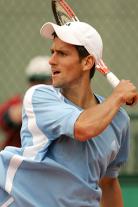 the shot landed centimeters long? Roddick spun his second serve in and won the point to beat French wild-card Jo-Wilfried Tsonga 6-3, 6-2, 6-4 (Tsonga’s Grand Slam debut; other well-known today player, but a Roland Garros debutant at the time, Novak Djokovic overwhelmed Robby Ginepri 6-0, 6-0, 6-3). Still trying to calibrate his game for clay, Roddick possesses the fastest serve in tennis but knows it will take more than that to win a major title on the sport’s slowest surface. “It’s not going to be the same as it is on grass or on hardcourt,” he said. “I think that goes without saying. Can it be a weapon? Yes, if it’s used effectively and if I make a high percentage. I think that’s key on clay.” Roddick won the U.S. Open in 2003, was runner-up at Wimbledon last year and is a two-time semifinalist at the Australian Open. But his record at Roland Garros is a modest 4-4. As a result, he’s not considered among the favorites, even though he’s seeded No. 2 behind Federer . “This is the one time of year where pretty much I get overlooked from the get-go,” Roddick said. “I’m trying to kind of take that attitude and just maybe try to surprise some people.” Paul-Henri Mathieu didn’t convert a match point leading 5:2* in the 3rd set against Feliciano Lopez, and a 4:0 advantage in a tie-break, but moved through the second round with a 6-2, 6-0, 6-7(5), 6-4 win.
the shot landed centimeters long? Roddick spun his second serve in and won the point to beat French wild-card Jo-Wilfried Tsonga 6-3, 6-2, 6-4 (Tsonga’s Grand Slam debut; other well-known today player, but a Roland Garros debutant at the time, Novak Djokovic overwhelmed Robby Ginepri 6-0, 6-0, 6-3). Still trying to calibrate his game for clay, Roddick possesses the fastest serve in tennis but knows it will take more than that to win a major title on the sport’s slowest surface. “It’s not going to be the same as it is on grass or on hardcourt,” he said. “I think that goes without saying. Can it be a weapon? Yes, if it’s used effectively and if I make a high percentage. I think that’s key on clay.” Roddick won the U.S. Open in 2003, was runner-up at Wimbledon last year and is a two-time semifinalist at the Australian Open. But his record at Roland Garros is a modest 4-4. As a result, he’s not considered among the favorites, even though he’s seeded No. 2 behind Federer . “This is the one time of year where pretty much I get overlooked from the get-go,” Roddick said. “I’m trying to kind of take that attitude and just maybe try to surprise some people.” Paul-Henri Mathieu didn’t convert a match point leading 5:2* in the 3rd set against Feliciano Lopez, and a 4:0 advantage in a tie-break, but moved through the second round with a 6-2, 6-0, 6-7(5), 6-4 win.
Second round: Steve Wilstein
One charismatic teen bludgeoned the ball, the other stroked it elegantly. The first showed off sculpted biceps with a sleeveless neon green shirt, the other motored around court on muscle-bulging legs. Spain’s Rafael Nadal and France’s Richard Gasquet, 18-year-olds born 15 days and a couple hundred miles apart, proved there wasn’t a shred of hype about their talents as one followed the other with masterful center court victories at the French Open on Wednesday to set up a third-round showdown. “Allez Gasquet!” “Allez Nadal!” The cheers rang out for hours as Nadal, the flashier of the two, won in straight sets just as Gasquet did before him. They, not No. 1 Roger Federer, were the talk of the tournament for the moment. The Swiss advanced easily to the third round, too, and he could meet one of the teen sensations in the semifinals – the day Nadal turns 19. 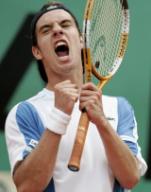 Nadal, the No. 4 seed and winner of five clay-court tournaments this year, wins by imposing his will on opponents, keeping them on the defensive, and playing with relentless energy, as he did Wednesday in a 6-2, 6-2, 6-4 victory over Belgium’s Xavier Malisse. His deft touch on drop shots, even from behind the baseline, serves as a counterpoint to his brutal ground-strokes. Gasquet, who turns 19 on June 18, unleashed fluid forehands and stunningly hard, one-handed backhands in beating net-charging Peter Wessels of the Netherlands 6-3, 7-6(1), 6-1. Unfortunately for Gasquet, Nadal will not present as easy a target for passing shots as Wessels did. “I will need to play fantastically if I want to win against Nadal because he’s a great player,” said Gasquet, who beat Federer on clay in Monte Carlo last month before losing to Nadal in the semis. Gasquet reached the final in Hamburg, then lost to Federer in a tournament that Nadal sat out because of hand blisters. “It will have to be the perfect match on my side because otherwise I will not win.” Federer beat Spanish 19-year-old Nicolas Almagro 6-3, 7-6(0), 6-2 as he bids for the only Grand Slam to elude him. Federer has never gone past the quarterfinals at the French Open and was briefly troubled by Almagro in the second set. “It was a big relief for me to come through in the tiebreaker,” Federer said. “I’m feeling like I’m getting more feeling for the courts. I’m seeing everything they have to offer. The court today was quicker and I think I’m getting my rhythm.” Marat Safin overcame a painful knee injury to thunder into the third round with a 6-7(6), 6-3, 7-5, 6-1 win over Czech Lukas Dlouhy. With his left knee strapped, the Russian overcame a slow start to advance in 2 hours and 26 minutes on court one and book a meeting with fellow former world number one Juan Carlos Ferrero. “My knee still hurts as I have tendonitis,” he said. “It start to bother me each time more and more. So I have to take care of it. It’s hurting me. If I call the doctor it’s not because I have nothing better to do. It’s just because it’s really bothering me, especially when I serve. I cannot put the weight on one leg, the left one.” Safin said he would have his knee treated on Friday and hope to be in shape to face Ferrero. “I have one day off,” the Australian Open champion said. “I’ll get a treatment tomorrow morning, afternoon, take some pills, some painkillers and try to go out and play against Ferrero. I will see.” Argentine eighth seed Guillermo Coria was given a torrid time before his Serbian opponent Novak Djokovic retired from their second round match. Coria, runner-up to compatriot Gaston Gaudio at Roland Garros last year, had just established a 4-6, 6-2, 3-2 lead when Novak Djokovic quit. The Serb had been hobbling and flexing his foot on court, but organizers later said he had been suffering from a respiratory problem. Despite being ranked a lowly 153rd, Djokovic rattled eighth seed Coria in the first set with his pace around the court and with the depth of his ground-strokes. “He started very fast. He was playing very high balls. I was a little bit surprised at his speed at the beginning of the match,” admitted Coria. “He was running around like a rabbit, he was trying to do everything. He was moving me around the court…he was playing very well. It’s very difficult to play someone you don’t know very well. Of course, I knew it was going to be difficult for him to hold out like that
Nadal, the No. 4 seed and winner of five clay-court tournaments this year, wins by imposing his will on opponents, keeping them on the defensive, and playing with relentless energy, as he did Wednesday in a 6-2, 6-2, 6-4 victory over Belgium’s Xavier Malisse. His deft touch on drop shots, even from behind the baseline, serves as a counterpoint to his brutal ground-strokes. Gasquet, who turns 19 on June 18, unleashed fluid forehands and stunningly hard, one-handed backhands in beating net-charging Peter Wessels of the Netherlands 6-3, 7-6(1), 6-1. Unfortunately for Gasquet, Nadal will not present as easy a target for passing shots as Wessels did. “I will need to play fantastically if I want to win against Nadal because he’s a great player,” said Gasquet, who beat Federer on clay in Monte Carlo last month before losing to Nadal in the semis. Gasquet reached the final in Hamburg, then lost to Federer in a tournament that Nadal sat out because of hand blisters. “It will have to be the perfect match on my side because otherwise I will not win.” Federer beat Spanish 19-year-old Nicolas Almagro 6-3, 7-6(0), 6-2 as he bids for the only Grand Slam to elude him. Federer has never gone past the quarterfinals at the French Open and was briefly troubled by Almagro in the second set. “It was a big relief for me to come through in the tiebreaker,” Federer said. “I’m feeling like I’m getting more feeling for the courts. I’m seeing everything they have to offer. The court today was quicker and I think I’m getting my rhythm.” Marat Safin overcame a painful knee injury to thunder into the third round with a 6-7(6), 6-3, 7-5, 6-1 win over Czech Lukas Dlouhy. With his left knee strapped, the Russian overcame a slow start to advance in 2 hours and 26 minutes on court one and book a meeting with fellow former world number one Juan Carlos Ferrero. “My knee still hurts as I have tendonitis,” he said. “It start to bother me each time more and more. So I have to take care of it. It’s hurting me. If I call the doctor it’s not because I have nothing better to do. It’s just because it’s really bothering me, especially when I serve. I cannot put the weight on one leg, the left one.” Safin said he would have his knee treated on Friday and hope to be in shape to face Ferrero. “I have one day off,” the Australian Open champion said. “I’ll get a treatment tomorrow morning, afternoon, take some pills, some painkillers and try to go out and play against Ferrero. I will see.” Argentine eighth seed Guillermo Coria was given a torrid time before his Serbian opponent Novak Djokovic retired from their second round match. Coria, runner-up to compatriot Gaston Gaudio at Roland Garros last year, had just established a 4-6, 6-2, 3-2 lead when Novak Djokovic quit. The Serb had been hobbling and flexing his foot on court, but organizers later said he had been suffering from a respiratory problem. Despite being ranked a lowly 153rd, Djokovic rattled eighth seed Coria in the first set with his pace around the court and with the depth of his ground-strokes. “He started very fast. He was playing very high balls. I was a little bit surprised at his speed at the beginning of the match,” admitted Coria. “He was running around like a rabbit, he was trying to do everything. He was moving me around the court…he was playing very well. It’s very difficult to play someone you don’t know very well. Of course, I knew it was going to be difficult for him to hold out like that 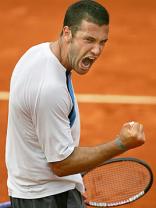 for five sets.” With the Serb playing his fifth match at Roland Garros since last Thursday, having won three matches in qualifying, the efforts of the past week caught up with him on a scorching day at the French capital. After almost two hours of play, he shook his head and abandoned the contest. Andy Roddick‘s French Open aspirations were shattered on Thursday following a 3-6, 4-6, 6-4, 6-3, 8-6 defeat by Argentina’s Jose Acasuso [62] in the second round. Roddick’s demise left the Americans without a man in the third round at Roland Garros for the second successive year. The second seed appeared to be heading for a straight sets victory but the momentum swung Acasuso’s way when Roddick dropped his serve midway through the third set. Both players struggled with cramps in the deciding set and had to receive treatment from the trainer but in the end, Acasuso’s desire to win proved stronger (Roddick led *3:1, 5:4 & 6:5). The 62nd-ranked Acasuso got the decisive break in the 13th game with a scorching passing shot before sealing Roddick’s fate with a forehand winner. Acasuso’s 3 hours 21 minutes victory put him into the third round of a Grand Slam event for the first time in his career and he will next face Italy’s Filippo Volandri. Roddick had arrived in Paris determined to improve on his third-round showing in 2001 but once again his expectations turned to dust on the red clay. As the match wore on, Acasuso outgunned and outwitted the American on the Suzanne Lenglen court. The defeat once again gave Roddick a losing record in Paris. In five visits to the season’s second grand slam tournament, he has now been defeated in five of the nine matches he has contested. “I felt fine out there and was playing really well, but I let it slip,” said Roddick. “I was as well prepared as ever coming in here but clay takes away a lot of my strengths and plays into the hands of other guys’ strengths. But I enjoy the challenge of it. Maybe I am going to have a run some time.” American misery was completed when Vince Spadea was forced to abandon his match with Germany’s Tommy Haas because of stomach cramps when he was trailing 6-4, 6-3. In a duel of
for five sets.” With the Serb playing his fifth match at Roland Garros since last Thursday, having won three matches in qualifying, the efforts of the past week caught up with him on a scorching day at the French capital. After almost two hours of play, he shook his head and abandoned the contest. Andy Roddick‘s French Open aspirations were shattered on Thursday following a 3-6, 4-6, 6-4, 6-3, 8-6 defeat by Argentina’s Jose Acasuso [62] in the second round. Roddick’s demise left the Americans without a man in the third round at Roland Garros for the second successive year. The second seed appeared to be heading for a straight sets victory but the momentum swung Acasuso’s way when Roddick dropped his serve midway through the third set. Both players struggled with cramps in the deciding set and had to receive treatment from the trainer but in the end, Acasuso’s desire to win proved stronger (Roddick led *3:1, 5:4 & 6:5). The 62nd-ranked Acasuso got the decisive break in the 13th game with a scorching passing shot before sealing Roddick’s fate with a forehand winner. Acasuso’s 3 hours 21 minutes victory put him into the third round of a Grand Slam event for the first time in his career and he will next face Italy’s Filippo Volandri. Roddick had arrived in Paris determined to improve on his third-round showing in 2001 but once again his expectations turned to dust on the red clay. As the match wore on, Acasuso outgunned and outwitted the American on the Suzanne Lenglen court. The defeat once again gave Roddick a losing record in Paris. In five visits to the season’s second grand slam tournament, he has now been defeated in five of the nine matches he has contested. “I felt fine out there and was playing really well, but I let it slip,” said Roddick. “I was as well prepared as ever coming in here but clay takes away a lot of my strengths and plays into the hands of other guys’ strengths. But I enjoy the challenge of it. Maybe I am going to have a run some time.” American misery was completed when Vince Spadea was forced to abandon his match with Germany’s Tommy Haas because of stomach cramps when he was trailing 6-4, 6-3. In a duel of 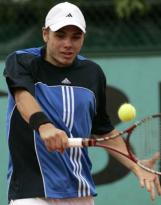 qualifiers, James Blake, coming back after a 2004 ravaged by illness and the death of his father, also surrendered a two-set lead to lose to Switzerland’s Stanislas Wawrinka 6-7(9), 5-7, 6-1, 6-3, 6-4. Blake saved five set points in the 1st set, it was his first defeat after 14-match winning streak (10 Challengers, 3 qualifying rounds). The 20-year-old Wawrinka [87], just like Tsonga, made his Grand Slam debut. Tim Henman failed to repeat his magical run to last year’s Roland Garros semifinals as he was bundled out 7-5, 6-7(2), 6-3, 6-4 by Peru’s Luis Horna in the second round on Wednesday. The 30-year-old seventh seed, who became the first Briton to make the last four here in 41 years when he made the semifinals in 2004, had no answer to Horna’s powerful baseline hitting. Henman said that the degenerating discs that had been troubling him this season were not a factor in the match. He dismissed it as “a bit of general stiffness” – “It didn’t have any effect on the way I was playing.”
qualifiers, James Blake, coming back after a 2004 ravaged by illness and the death of his father, also surrendered a two-set lead to lose to Switzerland’s Stanislas Wawrinka 6-7(9), 5-7, 6-1, 6-3, 6-4. Blake saved five set points in the 1st set, it was his first defeat after 14-match winning streak (10 Challengers, 3 qualifying rounds). The 20-year-old Wawrinka [87], just like Tsonga, made his Grand Slam debut. Tim Henman failed to repeat his magical run to last year’s Roland Garros semifinals as he was bundled out 7-5, 6-7(2), 6-3, 6-4 by Peru’s Luis Horna in the second round on Wednesday. The 30-year-old seventh seed, who became the first Briton to make the last four here in 41 years when he made the semifinals in 2004, had no answer to Horna’s powerful baseline hitting. Henman said that the degenerating discs that had been troubling him this season were not a factor in the match. He dismissed it as “a bit of general stiffness” – “It didn’t have any effect on the way I was playing.”
Third round: AP
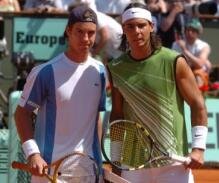 Fans may be ready for the game’s next great rivalry. Rafael Nadal [5] isn’t so sure. Nadal and fellow teenager Richard Gasquet [31] were born a mere 15 days apart and are considered two of the best prospects in the new generation of tennis players. The two met Friday for the second time this season – and for the second time Nadal beat the Frenchman, this time, 6-4, 6-3, 6-2, to advance to the fourth round at Roland Garros. “There has been a sort of rivalry made up and I don’t think it exists,” Nadal said. “We’re two young players. Probably he is going to be very soon among the top 10. There has been a lot of talk. Possibly he has been affected by the pressure.” Nadal scrambled to win the final point of the second set with a backhand off the wrong foot, threw a leaping uppercut in celebration and backpedaled to his chair. “It’s so tough,” said Gasquet, who lost his opening service game in each set and had his serve broken seven times overall. “It was so hot, but I did my best. Congratulations to Rafael. He was exceptional today.” Gasquet looked nervous when he stepped onto center court amid cheering French fans. He occasionally troubled his fellow 18-year-old by bringing Nadal up to the net and passing him down the line, but Gasquet’s normally lethal backhand proved erratic throughout and he sent too many forehands long. “The pressure affected us both and I think probably with everything that has been said, he had more than me,” Nadal said. “I did not expect to win like this. I play very good today.” Nadal, a favorite to win at Roland Garros, had only 20 unforced errors to Gasquet ‘s 46. The Spaniard has won five titles this year and has won 20 consecutive matches. “Physically he is on a different level,” Gasquet said. “Very few players can return balls like him. You get the impression he is never tired.” Nadal showed his grit and athleticism to win the final point of the second set. Gasquet’s backhand landed just in and Nadal flipped the ball back in the air, presenting Gasquet with a routine smash. Gasquet slammed the ball hard but Nadal pulled another backhand crosscourt for a winner. He punched the air in celebration before backpedaling to his chair. “It was a very important point,” Nadal said. “It’s
Fans may be ready for the game’s next great rivalry. Rafael Nadal [5] isn’t so sure. Nadal and fellow teenager Richard Gasquet [31] were born a mere 15 days apart and are considered two of the best prospects in the new generation of tennis players. The two met Friday for the second time this season – and for the second time Nadal beat the Frenchman, this time, 6-4, 6-3, 6-2, to advance to the fourth round at Roland Garros. “There has been a sort of rivalry made up and I don’t think it exists,” Nadal said. “We’re two young players. Probably he is going to be very soon among the top 10. There has been a lot of talk. Possibly he has been affected by the pressure.” Nadal scrambled to win the final point of the second set with a backhand off the wrong foot, threw a leaping uppercut in celebration and backpedaled to his chair. “It’s so tough,” said Gasquet, who lost his opening service game in each set and had his serve broken seven times overall. “It was so hot, but I did my best. Congratulations to Rafael. He was exceptional today.” Gasquet looked nervous when he stepped onto center court amid cheering French fans. He occasionally troubled his fellow 18-year-old by bringing Nadal up to the net and passing him down the line, but Gasquet’s normally lethal backhand proved erratic throughout and he sent too many forehands long. “The pressure affected us both and I think probably with everything that has been said, he had more than me,” Nadal said. “I did not expect to win like this. I play very good today.” Nadal, a favorite to win at Roland Garros, had only 20 unforced errors to Gasquet ‘s 46. The Spaniard has won five titles this year and has won 20 consecutive matches. “Physically he is on a different level,” Gasquet said. “Very few players can return balls like him. You get the impression he is never tired.” Nadal showed his grit and athleticism to win the final point of the second set. Gasquet’s backhand landed just in and Nadal flipped the ball back in the air, presenting Gasquet with a routine smash. Gasquet slammed the ball hard but Nadal pulled another backhand crosscourt for a winner. He punched the air in celebration before backpedaling to his chair. “It was a very important point,” Nadal said. “It’s 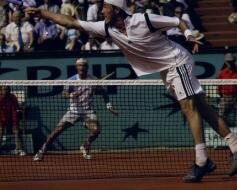 not because I’ve won this match that everything’s done. I’m very aware that I can lose at any time.” Marat Safin kept his cool to win the battle of the former world number ones with a 7-6(5), 7-5, 1-6, 7-6(2) victory over Juan Carlos Ferrero and reach the last 16 of the French Open on Saturday. The third-round contest had the potential to produce fireworks since Australian Open champion Safin had accused the Spaniard of acting like a 14-year-old after losing to him in the second round in Hamburg earlier this month. But the Russian third seed stuck to his task on court and ended the challenge of the 2003 Roland Garros champion with an emphatic smash after 3 hours 46 minutes. “I think the crowd should get a video cassette of this match because it was a classic,” said Safin as he left court with sweat dripping off his face. “I’m taking this tournament very seriously and in this sort of match you have to take your opportunities when they come.” The 25-year-old Safin has been a crowd favourite in Paris since reaching the fourth round as a qualifier in 1998 and treated the crowd to a high quality contest. Although Safin has often been undone by his own volatile temperament, on Saturday he simply kept a lid on his emotions as he attempted to secure his first win in two years over the Spaniard. Fererro, who is on the comeback trail after illness and injury ruined his 2004 season, held an early break in each set, only to see Safin wipe out the advantage on another sweltering day in the French capital (the Spaniard had really good position to win first two sets, he was serving at 5:4 ‘deuce’ in the 1st set and led 4:1* in the 2nd). “I played well and I lost,” said a dejected Ferrero. “I had many chances to win… but when you don’t take them, you go to the shower losing. Against Safin, you have to be 100 percent to win… but today he just surprised me physically. He didn’t look tired and just fought till the end.” After Safin had edged into a two-set lead, Ferrero finally broke the pattern in the third when the Russian appeared to take his foot off the pedal. The players stepped up the pace in the fourth as each searched for the vital breakthrough. Trading searing groundstrokes from the baseline, there was little to separate the pair as they headed into a tie-break. But with victory in sight, the world number four eventually piled on the pressure by racing into a 6:2 lead. One match point was all he needed in the end as he kept his eye on the ball to punch away the smash and take his place in the last 16 for the second year running. Modesty aside, Roger Federer notes that he’s the best tennis player in the world and he has beaten everyone there is to beat. So, he fears no one. While it’s premature to hail him the greatest tennis player in history, Federer feels he’s on the right track. “I’m too young,” the 23-year-old said Friday after advancing to the fourth round of the French Open and a question was raised about his stature as the best player tennis has ever seen. However, he doesn’t rule out owning such a superlative in the future, “if I keep playing like last year.” Federer, ranked No. 1 since February 2004, doesn’t consider clay his best surface – the French Open is the only major he hasn’t won. But he dismisses the notion that he can’t master this major. “I haven’t lost a set yet,” Federer rightfully pointed out after beating No. 25-seeded Fernando Gonzalez 7-6(9), 7-5, 6-2. “What’s the problem? I don’t see why I should be worried about anything.” The Swiss fought off two set points in the tie-break. A sweltering sun and 86-degree heat (30 Celsius) baked Roland Garros’ clay courts for a second day Friday. Everyone seemed to be talking about the heat. Carlos Moya said he was feeling weak, but he still won. “Today has been a tough day,” said Moya, who needed seven match points before beating qualifier Fernando Vicente 6-4, 7-6(4), 6-7(3), 0-6, 6-4. “And the heat played a major role.” Moya squandered four match points at 5:4* in the 3rd set, another one serving at 5:2 in the 5th set, and Vicente almost took the momentum to win one one of the most amazing matches in Roland Garros
not because I’ve won this match that everything’s done. I’m very aware that I can lose at any time.” Marat Safin kept his cool to win the battle of the former world number ones with a 7-6(5), 7-5, 1-6, 7-6(2) victory over Juan Carlos Ferrero and reach the last 16 of the French Open on Saturday. The third-round contest had the potential to produce fireworks since Australian Open champion Safin had accused the Spaniard of acting like a 14-year-old after losing to him in the second round in Hamburg earlier this month. But the Russian third seed stuck to his task on court and ended the challenge of the 2003 Roland Garros champion with an emphatic smash after 3 hours 46 minutes. “I think the crowd should get a video cassette of this match because it was a classic,” said Safin as he left court with sweat dripping off his face. “I’m taking this tournament very seriously and in this sort of match you have to take your opportunities when they come.” The 25-year-old Safin has been a crowd favourite in Paris since reaching the fourth round as a qualifier in 1998 and treated the crowd to a high quality contest. Although Safin has often been undone by his own volatile temperament, on Saturday he simply kept a lid on his emotions as he attempted to secure his first win in two years over the Spaniard. Fererro, who is on the comeback trail after illness and injury ruined his 2004 season, held an early break in each set, only to see Safin wipe out the advantage on another sweltering day in the French capital (the Spaniard had really good position to win first two sets, he was serving at 5:4 ‘deuce’ in the 1st set and led 4:1* in the 2nd). “I played well and I lost,” said a dejected Ferrero. “I had many chances to win… but when you don’t take them, you go to the shower losing. Against Safin, you have to be 100 percent to win… but today he just surprised me physically. He didn’t look tired and just fought till the end.” After Safin had edged into a two-set lead, Ferrero finally broke the pattern in the third when the Russian appeared to take his foot off the pedal. The players stepped up the pace in the fourth as each searched for the vital breakthrough. Trading searing groundstrokes from the baseline, there was little to separate the pair as they headed into a tie-break. But with victory in sight, the world number four eventually piled on the pressure by racing into a 6:2 lead. One match point was all he needed in the end as he kept his eye on the ball to punch away the smash and take his place in the last 16 for the second year running. Modesty aside, Roger Federer notes that he’s the best tennis player in the world and he has beaten everyone there is to beat. So, he fears no one. While it’s premature to hail him the greatest tennis player in history, Federer feels he’s on the right track. “I’m too young,” the 23-year-old said Friday after advancing to the fourth round of the French Open and a question was raised about his stature as the best player tennis has ever seen. However, he doesn’t rule out owning such a superlative in the future, “if I keep playing like last year.” Federer, ranked No. 1 since February 2004, doesn’t consider clay his best surface – the French Open is the only major he hasn’t won. But he dismisses the notion that he can’t master this major. “I haven’t lost a set yet,” Federer rightfully pointed out after beating No. 25-seeded Fernando Gonzalez 7-6(9), 7-5, 6-2. “What’s the problem? I don’t see why I should be worried about anything.” The Swiss fought off two set points in the tie-break. A sweltering sun and 86-degree heat (30 Celsius) baked Roland Garros’ clay courts for a second day Friday. Everyone seemed to be talking about the heat. Carlos Moya said he was feeling weak, but he still won. “Today has been a tough day,” said Moya, who needed seven match points before beating qualifier Fernando Vicente 6-4, 7-6(4), 6-7(3), 0-6, 6-4. “And the heat played a major role.” Moya squandered four match points at 5:4* in the 3rd set, another one serving at 5:2 in the 5th set, and Vicente almost took the momentum to win one one of the most amazing matches in Roland Garros  history as he led 40/0 in the 10th game – Moya won four points in a row, and after wasting another match point, grabbed the last two points to win in 3 hours 51 minutes. In the lower half of the draw much more longer five-setter occurred (5 hours 4 minutes, but stretched over two days), between No. 9 Guillermo Canas and Paul-Henri Mathieu on Suzanne Lenglen court. The match was halted because of darkness at 2-all in the 3rd set on Saturday. On the following day, Canas could win in four (led 5:2 in a tie-break), then should have lost in five because the Frenchman was serving at 5:4 (40/15). Ultimately Canas saved two match points and defeated his opponent 6-3, 7-6(4), 2-6, 6-7(5), 8-6. He next meets Nicolas Kiefer who defeated Igor Andreev 6-4, 7-6(3), 3-6, 6-4. Canas was right at the edge of his 11th defeat in 21 five-set matches, and this would have been the fifth time he lost after holding a two-set lead. But Mathieu, who failed to convert two match points against Sargis Sargsian at last year’s U.S. Open, made two egregious errors and, at deuce, misfired an easy overhead wide to put Canas in position to break back to 6:6. “I think about it (his four blown two-set leads) in one moment in the match,” Canas said. “But I try to just focus on tennis. I knew I could lose or win, that it could go either way. And then I started to take more risks.”
history as he led 40/0 in the 10th game – Moya won four points in a row, and after wasting another match point, grabbed the last two points to win in 3 hours 51 minutes. In the lower half of the draw much more longer five-setter occurred (5 hours 4 minutes, but stretched over two days), between No. 9 Guillermo Canas and Paul-Henri Mathieu on Suzanne Lenglen court. The match was halted because of darkness at 2-all in the 3rd set on Saturday. On the following day, Canas could win in four (led 5:2 in a tie-break), then should have lost in five because the Frenchman was serving at 5:4 (40/15). Ultimately Canas saved two match points and defeated his opponent 6-3, 7-6(4), 2-6, 6-7(5), 8-6. He next meets Nicolas Kiefer who defeated Igor Andreev 6-4, 7-6(3), 3-6, 6-4. Canas was right at the edge of his 11th defeat in 21 five-set matches, and this would have been the fifth time he lost after holding a two-set lead. But Mathieu, who failed to convert two match points against Sargis Sargsian at last year’s U.S. Open, made two egregious errors and, at deuce, misfired an easy overhead wide to put Canas in position to break back to 6:6. “I think about it (his four blown two-set leads) in one moment in the match,” Canas said. “But I try to just focus on tennis. I knew I could lose or win, that it could go either way. And then I started to take more risks.”
Fourth round: AP
Australian Open champion Marat Safin, defending French Open champ Gaston Gaudio and last year’s runner-up, Guillermo Coria, all lost in the fourth round. Safin, who also owns a U.S. Open title, was eliminated by Spain’s Tommy Robredo 7-5, 1-6, 6-1, 4-6, 8-6 in 3 hours, 50 minutes.  Argentine compatriots Gaudio and Coria were knocked out 26 minutes apart. Gaudio, who saved two match points in a five-set final against Coria last year, showed less spirit this time around, losing 2-6, 6-4, 7-6(5), 5-7, 6-4 (4 hours 5 minutes) to David Ferrer after holding a 4:0 lead in the deciding set. “I got too nervous, I guess,” Gaudio said. “I knew I could come back,” Ferrer said. “In the end I just let my shots go and everything worked out. That’s what tennis is all about. Anything can happen. Until the end of the match, you can’t really say it’s done.” Coria conceded that his opponent, the 12th-seeded Nikolay Davydenko, deserved the 2-6, 6-3, 7-6(1), 6-2 victory. “He took risks on set points in my favor and won,” Coria said. “There’s nothing to be angry about.” The Argentine started the match leading 5:0 in the opening set, then blew set points in the 9th and 12th games of the 3rd set. “I have been playing a little bit better and contest every point,” said Davydenko. “I am not playing the best of my best but I had to make sure against Coria that I hit a lot of top spin and didn’t give him any power.“ The Russian signalized a great form one round earlier as he destroyed Tommy Haas 7-5, 6-0, 6-0. Safin threw a brief tantrum in the third set of his marathon, leaving a hole in the base of his wooden changeover chair when he smashed it with a racket. “I destroyed the chair. I destroyed the racket because I can’t take it any more,” Safin said. “I had to relieve everything I had inside just to continue fighting.” He eventually regained his composure, but committed 73 unforced errors and lost. “Not one thing went the way I wanted it to go,” Safin said. “I had to
Argentine compatriots Gaudio and Coria were knocked out 26 minutes apart. Gaudio, who saved two match points in a five-set final against Coria last year, showed less spirit this time around, losing 2-6, 6-4, 7-6(5), 5-7, 6-4 (4 hours 5 minutes) to David Ferrer after holding a 4:0 lead in the deciding set. “I got too nervous, I guess,” Gaudio said. “I knew I could come back,” Ferrer said. “In the end I just let my shots go and everything worked out. That’s what tennis is all about. Anything can happen. Until the end of the match, you can’t really say it’s done.” Coria conceded that his opponent, the 12th-seeded Nikolay Davydenko, deserved the 2-6, 6-3, 7-6(1), 6-2 victory. “He took risks on set points in my favor and won,” Coria said. “There’s nothing to be angry about.” The Argentine started the match leading 5:0 in the opening set, then blew set points in the 9th and 12th games of the 3rd set. “I have been playing a little bit better and contest every point,” said Davydenko. “I am not playing the best of my best but I had to make sure against Coria that I hit a lot of top spin and didn’t give him any power.“ The Russian signalized a great form one round earlier as he destroyed Tommy Haas 7-5, 6-0, 6-0. Safin threw a brief tantrum in the third set of his marathon, leaving a hole in the base of his wooden changeover chair when he smashed it with a racket. “I destroyed the chair. I destroyed the racket because I can’t take it any more,” Safin said. “I had to relieve everything I had inside just to continue fighting.” He eventually regained his composure, but committed 73 unforced errors and lost. “Not one thing went the way I wanted it to go,” Safin said. “I had to 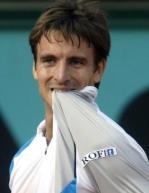 struggle with everything. I’m not taking away any credit from him. He played really well. But I was missing a little something.” Robredo, who was serving twice to stay in the match said: “I was very concentrated and I think I was calmer than he was. It was very tight. I got lucky and I think he was a little nervous. He’s a player who likes to win every point and sometimes he makes a lot of mistakes as a result. That was the key today.” If Rafael Nadal and Roger Federer win their quarterfinal matches, they will clash in the semifinals Friday – Nadal’s 19th birthday. No. 4 Nadal turned a small advantage into a convincing win, overcoming No. 23 Sebastien Grosjean 6-4, 3-6, 6-0, 6-3. The match stretched over two days because of Sunday’s rain delay. Play resumed with Nadal leading 3:0 in the third set. On Friday, Nadal beat fellow 18-year-old Richard Gasquet, a Frenchman and the latest crowd favorite at Roland Garros. Gasquet said he felt like a junior afterward – a suggestion that the muscular Nadal won the match on two fronts, physically and psychologically. “I know who I am, whatever people say,” Nadal said. “Your inspiration comes from within. It doesn’t come from anywhere else.” When Federer charged forward and blew an easy volley, he glared at the ball dribbling at his feet, swiped at it in anger, kicked it and still couldn’t get it over the net. A frustrated Federer on the verge of defeat? Not exactly: at the time, he was up by two sets and 3:0 in the third set against Carlos Moya. But his standards are high and, aside from the occasional misplay, he has met them thus far at the French Open. The top-ranked Federer equaled his best showing at Roland Garros when he advanced to the quarterfinals Sunday, shaking off the errant volley to beat an ailing Moya 6-1, 6-4, 6-3. Federer improved to 45-2 this year. He has yet to drop a set through four rounds at the only Grand Slam event he hasn’t won. ”I’m very relieved in a way, and happy to have come so far after a few years of tough times here in Paris,” Federer said. ”I’ve won four matches, which is good. But of course once you get to the quarters, you want more, especially because I haven’t been using my reserve tank yet. I still have a lot of energy left. I’m looking
struggle with everything. I’m not taking away any credit from him. He played really well. But I was missing a little something.” Robredo, who was serving twice to stay in the match said: “I was very concentrated and I think I was calmer than he was. It was very tight. I got lucky and I think he was a little nervous. He’s a player who likes to win every point and sometimes he makes a lot of mistakes as a result. That was the key today.” If Rafael Nadal and Roger Federer win their quarterfinal matches, they will clash in the semifinals Friday – Nadal’s 19th birthday. No. 4 Nadal turned a small advantage into a convincing win, overcoming No. 23 Sebastien Grosjean 6-4, 3-6, 6-0, 6-3. The match stretched over two days because of Sunday’s rain delay. Play resumed with Nadal leading 3:0 in the third set. On Friday, Nadal beat fellow 18-year-old Richard Gasquet, a Frenchman and the latest crowd favorite at Roland Garros. Gasquet said he felt like a junior afterward – a suggestion that the muscular Nadal won the match on two fronts, physically and psychologically. “I know who I am, whatever people say,” Nadal said. “Your inspiration comes from within. It doesn’t come from anywhere else.” When Federer charged forward and blew an easy volley, he glared at the ball dribbling at his feet, swiped at it in anger, kicked it and still couldn’t get it over the net. A frustrated Federer on the verge of defeat? Not exactly: at the time, he was up by two sets and 3:0 in the third set against Carlos Moya. But his standards are high and, aside from the occasional misplay, he has met them thus far at the French Open. The top-ranked Federer equaled his best showing at Roland Garros when he advanced to the quarterfinals Sunday, shaking off the errant volley to beat an ailing Moya 6-1, 6-4, 6-3. Federer improved to 45-2 this year. He has yet to drop a set through four rounds at the only Grand Slam event he hasn’t won. ”I’m very relieved in a way, and happy to have come so far after a few years of tough times here in Paris,” Federer said. ”I’ve won four matches, which is good. But of course once you get to the quarters, you want more, especially because I haven’t been using my reserve tank yet. I still have a lot of energy left. I’m looking 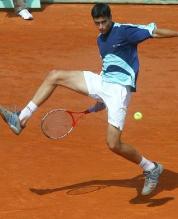 forward to hopefully another few more matches.” Moya, the 1998 champion, gave Federer little trouble wspan style=”color: #33cccc;”hile playing with a sore shoulder that hindered his serve and forehand. The Spaniard said he needs rest and isn’t sure whether he’ll play Wimbledon. Federer’s opponent Tuesday will be 90th-ranked Victor Hanescu, who upset No. 10 David Nalbandian 6-3, 4-6, 5-7, 6-1, 6-2. Hanescu, who arrived in Paris with a record of 6-9 this year, will play in his first Grand Slam quarterfinal. ‘‘When I started to play tennis, I was dreaming to be here,” Hanescu said. ”My family is a poor family. When I was young, we didn’t have so much money even to eat sometimes. Now I’m here and very happy.” No. 9 Guillermo Canas advanced to the quarterfinals receiving a walkover from Nicolas Kiefer. “Against Andreev it was again a piece of hard work. Since midway the first set I played under pain. I had a jammed nerve and pain in the neck and therefore I was glad when the match was finally suspended.” Kiefer explained the reason of his withdrawal. In the fastest match of the fourth round Mariano Puerta defeated fellow Argentine Jose Acasuso 6-4, 6-1, 6-1.
forward to hopefully another few more matches.” Moya, the 1998 champion, gave Federer little trouble wspan style=”color: #33cccc;”hile playing with a sore shoulder that hindered his serve and forehand. The Spaniard said he needs rest and isn’t sure whether he’ll play Wimbledon. Federer’s opponent Tuesday will be 90th-ranked Victor Hanescu, who upset No. 10 David Nalbandian 6-3, 4-6, 5-7, 6-1, 6-2. Hanescu, who arrived in Paris with a record of 6-9 this year, will play in his first Grand Slam quarterfinal. ‘‘When I started to play tennis, I was dreaming to be here,” Hanescu said. ”My family is a poor family. When I was young, we didn’t have so much money even to eat sometimes. Now I’m here and very happy.” No. 9 Guillermo Canas advanced to the quarterfinals receiving a walkover from Nicolas Kiefer. “Against Andreev it was again a piece of hard work. Since midway the first set I played under pain. I had a jammed nerve and pain in the neck and therefore I was glad when the match was finally suspended.” Kiefer explained the reason of his withdrawal. In the fastest match of the fourth round Mariano Puerta defeated fellow Argentine Jose Acasuso 6-4, 6-1, 6-1.
Quarterfinals: (Reuters)
Rafael Nadal set up a dream French Open semifinal with world number one Roger Federer on Tuesday after crushing fellow Spaniard David Ferrer 7-5, 6-2, 6-0. Federer had earlier moved closer to an elusive Roland Garros title when he beat Romanian Victor Hanescu 6-2, 7-6(3), 6-3 to reach the last four for the first time. The 18-year-old Nadal is bidding to become the first player to win the clay-court Grand Slam at the first attempt since Mats Wilander in 1982. He saved a set point in the first set before stamping his authority on the match after Ferrer needed treatment on 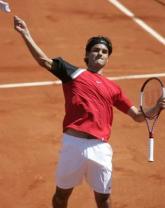 his back in the second set. Nadal showed no mercy as he unleashed his full repertoire of shots, clinching victory in 2 hours 8 minutes. Fourth seed Nadal has now won 22 consecutive matches, all on clay, including Masters Series titles in Monte Carlo and Rome. Top seed Federer, whose previous best result on the Paris clay was a quarterfinal appearance in 2001, became the second active player behind Andre Agassi to have reached the last four at four consecutive Grand Slam events. “Being in the semifinals for the first time here is great,” said Federer who is yet to drop a set. “I’m very satisfied with my game and my form so far. I feel I have plenty of energy left. I’m glad to be able to prove that I can do well in this tournament.” Federer has often struggled here, losing in the first round in two of the last three years, and he has a chance to become the sixth man in history to win all four major titles. After winning the first set easily, Federer underlined his determination by fighting back from a break down in the second to force a tie break, which he took with a service winner on set point. World number 90 Hanescu, 23 like Federer, mounted a brave challenge in that second set but then collapsed, Federer building a 5:1 lead in the third set to serve for the match. Federer showed signs of nerves for the first time, wasting two match points and losing his serve after committing three double faults. When he served for the match again, Hanescu survived another match point before bowing out by hitting a forehand long after just over two hours of play. Mariano Puerta reached his first Grand Slam semifinal at the French Open on Wednesday, the Argentine’s return to top flight tennis complete following a nine-month anti-doping ban. The 26-year-old, who has hauled his ranking up from 440 to 37 after testing positive for the banned drug clenbuterol in 2003, out-gunned compatriot Guillermo Canas 6-2, 3-6, 1-6, 6-3, 6-4. Both Puerta and Canas learned their trade on the slow clay courts of Buenos Aires, and a long, tough test of patience and stamina was expected. Neither player disappointed. Ninth seed Canas had been the favourite but on the Roland Garros centre court there was nothing to separate the former junior team mates. For five sets the energetic Canas scurried and chased, shovelling the ball back with his compact, economic strokes. Puerta, a runner-up in the boy’s singles here in 1995, threw everything at his opponent, his looping left-handed shots finding ever-more acute angles before Canas cracked for the last time. The 27-year-old ninth seed simply ran out of ideas. “I cannot believe I’ve reached the semifinals, I really want to enjoy this moment”, Puerta said Clenbuterol promotes muscle growth. An anti-doping tribunal determined last year that Puerta had been prescribed the drug by a doctor to treat an acute asthma attack. The player has always denied any wrongdoing and said on Wednesday his exile had made him stronger. “I don’t really feel bitter”, he added. “I just don’t think back… don’t waste my energy remembering things in the past. But I think it helped me to be stronger psychologically today, since every victory for me is even more important. When you go through a rough period, I’m sure that it just makes you become stronger. It’s hard for people to sink you. Everything I went through helps me feel calmer, and it has helped me mature and overcome difficult moments.” Puerta will next face Russian Nikolay Davydenko in Friday’s semifinal, who overcame 12th seed Spaniard Tommy Robredo 3-6, 6-1, 6-2, 4-6, 6-4. He had to endure a tense final set decider, after being up by two sets to one as well as a break to the good at 4:3 in the fourth, and then squandered three match points in the ninth game of the deciding set before wrapping up the tie on serve. Davydenko was playing in his second successive Grand Slam quarterfinal, after making the last eight at the Australian Open in January, and he was the man in form having won the St Poelten warm-up event on the eve of Roland Garros. In a nervy opening, both players exchanged breaks in the first two games but Robredo settled into a solid, baseline rhythm faster than the Russian and wrapped up the first set after 39 minutes. But Davydenko is used to uphill climbs in Paris having to recover from losing
his back in the second set. Nadal showed no mercy as he unleashed his full repertoire of shots, clinching victory in 2 hours 8 minutes. Fourth seed Nadal has now won 22 consecutive matches, all on clay, including Masters Series titles in Monte Carlo and Rome. Top seed Federer, whose previous best result on the Paris clay was a quarterfinal appearance in 2001, became the second active player behind Andre Agassi to have reached the last four at four consecutive Grand Slam events. “Being in the semifinals for the first time here is great,” said Federer who is yet to drop a set. “I’m very satisfied with my game and my form so far. I feel I have plenty of energy left. I’m glad to be able to prove that I can do well in this tournament.” Federer has often struggled here, losing in the first round in two of the last three years, and he has a chance to become the sixth man in history to win all four major titles. After winning the first set easily, Federer underlined his determination by fighting back from a break down in the second to force a tie break, which he took with a service winner on set point. World number 90 Hanescu, 23 like Federer, mounted a brave challenge in that second set but then collapsed, Federer building a 5:1 lead in the third set to serve for the match. Federer showed signs of nerves for the first time, wasting two match points and losing his serve after committing three double faults. When he served for the match again, Hanescu survived another match point before bowing out by hitting a forehand long after just over two hours of play. Mariano Puerta reached his first Grand Slam semifinal at the French Open on Wednesday, the Argentine’s return to top flight tennis complete following a nine-month anti-doping ban. The 26-year-old, who has hauled his ranking up from 440 to 37 after testing positive for the banned drug clenbuterol in 2003, out-gunned compatriot Guillermo Canas 6-2, 3-6, 1-6, 6-3, 6-4. Both Puerta and Canas learned their trade on the slow clay courts of Buenos Aires, and a long, tough test of patience and stamina was expected. Neither player disappointed. Ninth seed Canas had been the favourite but on the Roland Garros centre court there was nothing to separate the former junior team mates. For five sets the energetic Canas scurried and chased, shovelling the ball back with his compact, economic strokes. Puerta, a runner-up in the boy’s singles here in 1995, threw everything at his opponent, his looping left-handed shots finding ever-more acute angles before Canas cracked for the last time. The 27-year-old ninth seed simply ran out of ideas. “I cannot believe I’ve reached the semifinals, I really want to enjoy this moment”, Puerta said Clenbuterol promotes muscle growth. An anti-doping tribunal determined last year that Puerta had been prescribed the drug by a doctor to treat an acute asthma attack. The player has always denied any wrongdoing and said on Wednesday his exile had made him stronger. “I don’t really feel bitter”, he added. “I just don’t think back… don’t waste my energy remembering things in the past. But I think it helped me to be stronger psychologically today, since every victory for me is even more important. When you go through a rough period, I’m sure that it just makes you become stronger. It’s hard for people to sink you. Everything I went through helps me feel calmer, and it has helped me mature and overcome difficult moments.” Puerta will next face Russian Nikolay Davydenko in Friday’s semifinal, who overcame 12th seed Spaniard Tommy Robredo 3-6, 6-1, 6-2, 4-6, 6-4. He had to endure a tense final set decider, after being up by two sets to one as well as a break to the good at 4:3 in the fourth, and then squandered three match points in the ninth game of the deciding set before wrapping up the tie on serve. Davydenko was playing in his second successive Grand Slam quarterfinal, after making the last eight at the Australian Open in January, and he was the man in form having won the St Poelten warm-up event on the eve of Roland Garros. In a nervy opening, both players exchanged breaks in the first two games but Robredo settled into a solid, baseline rhythm faster than the Russian and wrapped up the first set after 39 minutes. But Davydenko is used to uphill climbs in Paris having to recover from losing 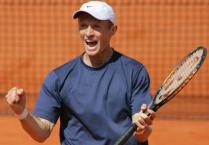 the first set in his second round match with Olivier Rochus and fourth round meeting with 2004 runner-up Guillermo Coria to get this far. He reduced his error count and broke the Spaniard three times in the second set to take it in just 28 minutes to level the contest. Davydenko was quickly on top again in the third set as Robredo, who had put out another Russian, third seed Marat Safin in the fourth round, struggled with his timing and his first serve. Davydenko raced to a 3:1 lead which soon became 5:2 as the Spaniard’s game began to fall apart and the Russian sealed the set when the bewildered Robredo hit long. The Russian then recovered from a break down to lead *4:3 in the fourth set but Robredo hung on and reeled off the next three games to take the set and level the contest after 2hr 28min. The 23-year-old Robredo, however, was in trouble straightaway in the decider when his brittle service was exposed again by the Russian who enjoyed a break in the first game. A fired-up Robredo was back on level terms at 2:2 courtesy of a whipped, backhand pass but the Russian then edged ahead with another break at 4:3 as both men began to tire. Davydenko held on for 5:3, when his opponent carelessly ballooned an easy forehand, and then carved out three match points, all of which were gallantly saved by the Spaniard in the ninth game. The Russian then saved two break points and went to his fourth match point which he converted when Robredo skewered a backhand wide of the line after 3 hours 18 minutes of action.
the first set in his second round match with Olivier Rochus and fourth round meeting with 2004 runner-up Guillermo Coria to get this far. He reduced his error count and broke the Spaniard three times in the second set to take it in just 28 minutes to level the contest. Davydenko was quickly on top again in the third set as Robredo, who had put out another Russian, third seed Marat Safin in the fourth round, struggled with his timing and his first serve. Davydenko raced to a 3:1 lead which soon became 5:2 as the Spaniard’s game began to fall apart and the Russian sealed the set when the bewildered Robredo hit long. The Russian then recovered from a break down to lead *4:3 in the fourth set but Robredo hung on and reeled off the next three games to take the set and level the contest after 2hr 28min. The 23-year-old Robredo, however, was in trouble straightaway in the decider when his brittle service was exposed again by the Russian who enjoyed a break in the first game. A fired-up Robredo was back on level terms at 2:2 courtesy of a whipped, backhand pass but the Russian then edged ahead with another break at 4:3 as both men began to tire. Davydenko held on for 5:3, when his opponent carelessly ballooned an easy forehand, and then carved out three match points, all of which were gallantly saved by the Spaniard in the ninth game. The Russian then saved two break points and went to his fourth match point which he converted when Robredo skewered a backhand wide of the line after 3 hours 18 minutes of action.
Semifinals: (AP)
Pouncing from the breezy start, bouncing at the dusky end, Rafael Nadal turned his 19th birthday into a milestone triumph over Roger Federer in a French Open semifinal that confirmed the Spanish prodigy’s arrival as a star on the Grand Slam stage. Moments before the fading twilight threatened to suspend the match, Nadal asserted his irrepressible will and his uncanny combination of speed, strength and creativity to reach the final of his first French Open with a 6-3, 4-6, 6-4, 6-3 victory Friday that ended Federer’s bid to complete a career Grand Slam. From the opening point, a  stunning forehand pass that whizzed by Federer on his serve, Nadal showed he was neither intimidated by the four-time Grand Slam winner, nor overwhelmed by the occasion. He had won five titles this year, all on clay, and he treated this biggest clay event of all as if he were born to win it. “I started bad and finished bad,” Federer said. “I was good in the middle, but that was not good enough.” They had walked out on court with different demeanors, Nadal unsmiling and intense, Federer relaxed and waving, the crowd giving both an ovation as they settled in for what promised to be the match of the tournament. The fans would not be disappointed. It was now nearly 8 p.m. after two sets and, with no lights at Roland Garros, it was apparent that the match might have to be suspended if it went five sets. A fifth set probably would not even be started after 9 p.m. Racing to beat the fading light and Federer, Nadal closed out the third set at 8:40 p.m. when he broke Federer in the final game. Nadal jogged out for what would be the last game of the set, holding a 5:4 lead, while Federer walked to the service line with a distinct weariness about him. On the third set point, Nadal grunted loudly with a forehand down the line, took Federer’s forehand response and belted an unreachable forehand back into an open court. Nadal bellowed in triumph, leaping and punching the air with his left fist. Nadal’s eagerness didn’t stop him from making a magnanimous gesture of sportsmanship even when he was down a break at 2:1 in the fourth set. With Federer serving at 40/15, a shot by the Swiss was called long. Nadal pointed to the spot, indicated the ball was good, and asked the umpire to replay the point. They did and Federer won it to go ahead 3:1, but that would be the last game he would win. Nadal charged back relentlessly to take a 4strong:3 lead. At 9:02 p.m., the court completely in shadows even with a play blue sky in the distance, Federer spoke to the umpire about how difficult it was to see. “I could hardly see the ball in the end,” said Federer, the 23-year-old holder of four major titles. “I am disappointed we continued. I wished we could have continued tomorrow.” Nadal will play for the championship Sunday against unseeded Argentine Mariano Puerta, a 6-3, 5-7, 2-6, 6-4, 6-4 winner over Russia’s Nikolay Davydenko. “I’m in paradise,” said Puerta, a nine-year pro. “I’m the happiest man on earth right now.” Puerta, an Argentine left-hander who has climbed to 37th in the rankings from 440th last August, struggled with his serve but kept Davydenko on the run throughout their 3-hour, 29-minute match. By the fourth set the Russian was occasionally bending over between points, hands on his knees, and he was unable to hold a 4:2 lead in the final set. “At the start of the fifth set I was thinking I would lose, feeling I have no chance to beat him,” Davydenko said. “I was losing from the baseline, losing control of games, losing every time.” The Russian made no excuses for losing the final four games. “I had no match point. I had problems all the time,” Davydenko said. “I was losing, losing, losing, losing. Like from 100 percent to zero. I cannot do anything. He just make topspin, forehand, backhand. For me… nothing.” Davydenko, a wiry athlete with good technique, was faster around the court and had the better serve. He served 11 aces and three double-faults to one ace and nine double-faults for Puerta. “It’s not enough,” a somber Davydenko said. Puerta’s mood was understandably much
stunning forehand pass that whizzed by Federer on his serve, Nadal showed he was neither intimidated by the four-time Grand Slam winner, nor overwhelmed by the occasion. He had won five titles this year, all on clay, and he treated this biggest clay event of all as if he were born to win it. “I started bad and finished bad,” Federer said. “I was good in the middle, but that was not good enough.” They had walked out on court with different demeanors, Nadal unsmiling and intense, Federer relaxed and waving, the crowd giving both an ovation as they settled in for what promised to be the match of the tournament. The fans would not be disappointed. It was now nearly 8 p.m. after two sets and, with no lights at Roland Garros, it was apparent that the match might have to be suspended if it went five sets. A fifth set probably would not even be started after 9 p.m. Racing to beat the fading light and Federer, Nadal closed out the third set at 8:40 p.m. when he broke Federer in the final game. Nadal jogged out for what would be the last game of the set, holding a 5:4 lead, while Federer walked to the service line with a distinct weariness about him. On the third set point, Nadal grunted loudly with a forehand down the line, took Federer’s forehand response and belted an unreachable forehand back into an open court. Nadal bellowed in triumph, leaping and punching the air with his left fist. Nadal’s eagerness didn’t stop him from making a magnanimous gesture of sportsmanship even when he was down a break at 2:1 in the fourth set. With Federer serving at 40/15, a shot by the Swiss was called long. Nadal pointed to the spot, indicated the ball was good, and asked the umpire to replay the point. They did and Federer won it to go ahead 3:1, but that would be the last game he would win. Nadal charged back relentlessly to take a 4strong:3 lead. At 9:02 p.m., the court completely in shadows even with a play blue sky in the distance, Federer spoke to the umpire about how difficult it was to see. “I could hardly see the ball in the end,” said Federer, the 23-year-old holder of four major titles. “I am disappointed we continued. I wished we could have continued tomorrow.” Nadal will play for the championship Sunday against unseeded Argentine Mariano Puerta, a 6-3, 5-7, 2-6, 6-4, 6-4 winner over Russia’s Nikolay Davydenko. “I’m in paradise,” said Puerta, a nine-year pro. “I’m the happiest man on earth right now.” Puerta, an Argentine left-hander who has climbed to 37th in the rankings from 440th last August, struggled with his serve but kept Davydenko on the run throughout their 3-hour, 29-minute match. By the fourth set the Russian was occasionally bending over between points, hands on his knees, and he was unable to hold a 4:2 lead in the final set. “At the start of the fifth set I was thinking I would lose, feeling I have no chance to beat him,” Davydenko said. “I was losing from the baseline, losing control of games, losing every time.” The Russian made no excuses for losing the final four games. “I had no match point. I had problems all the time,” Davydenko said. “I was losing, losing, losing, losing. Like from 100 percent to zero. I cannot do anything. He just make topspin, forehand, backhand. For me… nothing.” Davydenko, a wiry athlete with good technique, was faster around the court and had the better serve. He served 11 aces and three double-faults to one ace and nine double-faults for Puerta. “It’s not enough,” a somber Davydenko said. Puerta’s mood was understandably much  lighter. Playing in his first major event since serving a nine-month drug suspension, Puerta gives Roland Garros an unseeded men’s finalist for the third year in a row. Unseeded Argentine compatriot Gaston Gaudio won the title last year. Dutchman Martin Verkerk was runner-up in 2003. “I had two years when I was almost out of the circuit,” Puerta said. “I can’t believe that on Sunday I’m going to play the final of Roland Garros. I don’t even know how to explain that.” Puerta’s suspension began in October 2003 after he tested positive for clenbuterol, a drug whose effects resemble those of anabolic steroids by promoting muscle growth. An investigative panel determined a doctor prescribed the drug to Puerta to treat asthma. Now, at 26, he’s playing the best tennis of his life. “I work really hard, six, seven hours a day. I don’t stop. Sunday also,” Puerta said. “When I came back, I was prepared for very tough moments, to play anywhere. I was ready to sacrifice. I never complained about anything. I was humble and prepared to overcome any barrier.”
lighter. Playing in his first major event since serving a nine-month drug suspension, Puerta gives Roland Garros an unseeded men’s finalist for the third year in a row. Unseeded Argentine compatriot Gaston Gaudio won the title last year. Dutchman Martin Verkerk was runner-up in 2003. “I had two years when I was almost out of the circuit,” Puerta said. “I can’t believe that on Sunday I’m going to play the final of Roland Garros. I don’t even know how to explain that.” Puerta’s suspension began in October 2003 after he tested positive for clenbuterol, a drug whose effects resemble those of anabolic steroids by promoting muscle growth. An investigative panel determined a doctor prescribed the drug to Puerta to treat asthma. Now, at 26, he’s playing the best tennis of his life. “I work really hard, six, seven hours a day. I don’t stop. Sunday also,” Puerta said. “When I came back, I was prepared for very tough moments, to play anywhere. I was ready to sacrifice. I never complained about anything. I was humble and prepared to overcome any barrier.”
Final: (Wire reports)
Teen prodigy Rafael Nadal lost a tiebreaker filled with marvelous exchanges, faced three set points in the fourth set and still beat unseeded Argentine Mariano Puerta 6-7(6), 6-3, 6-1, 7-5 to win the French Open on Sunday for his first Grand Slam title (7th overall). Two days after celebrating his 19th birthday by defeating top-ranked Roger Federer, Nadal overcame a gallant effort from Puerta. “It was an unbelievable match,” Nadal said. “Puerta played a very good  match and sometimes in the match I (thought) I would lose.” The young Spaniard, seeded fourth, became the first man to win the French Open on his initial try since Mats Wilander, who claimed the first of his seven Grand Slam titles at Roland Garros in 1982. The opening set inspired the best kind of clay-court creativity, keeping both players on the run as they chased drop shots, lobs and sharply angled ground-strokes. Some of the best rallies came in the tiebreaker, with each point seemingly more spectacular than the last. Puerta, weary from consecutive 3½-hour five-setters in the previous two rounds, kept battling even after losing the second and third sets. “It’s amazing a feel a lot of things I’m very happy,” Puerta said. “I played very badly today but I lost against a great player, the best player on clay courts today.” Puerta’s efforts to force a fifth set won over the center-court crowd, who repeatedly chanted his name in the last set, and drew applause even from Nadal’s coach and uncle, Toni Nadal. The Argentine was one point from winning the fourth set serving at 5:4, 40/15, wasted another set point having an advantage. But in another series of thrilling exchanges, Nadal rallied to break serve for 5-all. Two games later, after 3 hours, 24 minutes of tennis, he closed out the victory when Puerta pushed a forehand wide. Nadal collapsed to the clay, flat on his back, then rose and embraced Puerta at the net. The young Spaniard then trotted to the other end of the court
match and sometimes in the match I (thought) I would lose.” The young Spaniard, seeded fourth, became the first man to win the French Open on his initial try since Mats Wilander, who claimed the first of his seven Grand Slam titles at Roland Garros in 1982. The opening set inspired the best kind of clay-court creativity, keeping both players on the run as they chased drop shots, lobs and sharply angled ground-strokes. Some of the best rallies came in the tiebreaker, with each point seemingly more spectacular than the last. Puerta, weary from consecutive 3½-hour five-setters in the previous two rounds, kept battling even after losing the second and third sets. “It’s amazing a feel a lot of things I’m very happy,” Puerta said. “I played very badly today but I lost against a great player, the best player on clay courts today.” Puerta’s efforts to force a fifth set won over the center-court crowd, who repeatedly chanted his name in the last set, and drew applause even from Nadal’s coach and uncle, Toni Nadal. The Argentine was one point from winning the fourth set serving at 5:4, 40/15, wasted another set point having an advantage. But in another series of thrilling exchanges, Nadal rallied to break serve for 5-all. Two games later, after 3 hours, 24 minutes of tennis, he closed out the victory when Puerta pushed a forehand wide. Nadal collapsed to the clay, flat on his back, then rose and embraced Puerta at the net. The young Spaniard then trotted to the other end of the court 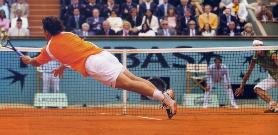 to shake hands with the king of Spain sitting in the first row. With his 24th consecutive victory, Nadal surpassed Andre Agassi for the longest winning streak by a male teen in the Open era. All of the victories have come on clay. Nadal celebrated shots by flexing his Popeye-caliber biceps, and with leaps, uppercuts, and other muscular moves worthy of Olympic judo champion David Douillet of France, seated in the second row. But while the charismatic teen delighted fans, so did the journeyman Puerta. He won one point with a flying forehand volley, a la Boris Becker, and another when he faked a drop shot to send Nadal into a skid, then hit a deep forehand winner instead. It was the first all-lefty men’s final at Roland Garros since 1946 (ninth all-left-handed Open era final), and Nadal become the first left-handed men’s champion since Thomas Muster in 1995. He’s the youngest men’s winner since Michael Chang, the champ in 1989 at age 17. On a cool, gray afternoon, Nadal broke in the opening game
to shake hands with the king of Spain sitting in the first row. With his 24th consecutive victory, Nadal surpassed Andre Agassi for the longest winning streak by a male teen in the Open era. All of the victories have come on clay. Nadal celebrated shots by flexing his Popeye-caliber biceps, and with leaps, uppercuts, and other muscular moves worthy of Olympic judo champion David Douillet of France, seated in the second row. But while the charismatic teen delighted fans, so did the journeyman Puerta. He won one point with a flying forehand volley, a la Boris Becker, and another when he faked a drop shot to send Nadal into a skid, then hit a deep forehand winner instead. It was the first all-lefty men’s final at Roland Garros since 1946 (ninth all-left-handed Open era final), and Nadal become the first left-handed men’s champion since Thomas Muster in 1995. He’s the youngest men’s winner since Michael Chang, the champ in 1989 at age 17. On a cool, gray afternoon, Nadal broke in the opening game 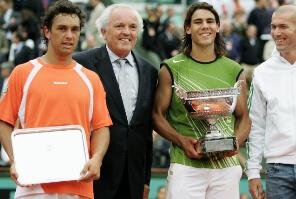 and led 3:1 (40/15) when Puerta called for a trainer. He grimaced as the trainer massaged his right thigh, then taped it. With that, Puerta rallied. He won the game, then broke serve for 3-all. Both players held to the tiebreaker, and Nadal led 3:2 when the two players began a sequence of six consecutive spectacular points. Each involved scrambling exchanges with plenty of improvisation and improbable saves. When Nadal sent a backhand winner down line for a 5:4 lead, he dropped his racket so he could celebrate with both hands, then pounded his chest with his fist. At 5-all, the Spaniard went into a shoulder roll in the clay trying to scoop out a shot in the corner. He lost the point, and two points later his lob landed a millimeter wide, giving Puerta the set after 72 minutes. Nadal was 1-for-8 on break-point chances before he converted for a 3:1 lead in the second set. He broke three more times in the third set while easily holding serve, but there was more drama to come. Nadal received $1,082,400 for his sixth tournament title this year, all on clay. Puerta, who arrived in Paris with a career Grand Slam record of 8-15 and a tainted reputation after serving a nine-month drug suspension, won admirers with his grinding style and received $541,200 (a few months later he was forced to take the money back). Stats of the final
and led 3:1 (40/15) when Puerta called for a trainer. He grimaced as the trainer massaged his right thigh, then taped it. With that, Puerta rallied. He won the game, then broke serve for 3-all. Both players held to the tiebreaker, and Nadal led 3:2 when the two players began a sequence of six consecutive spectacular points. Each involved scrambling exchanges with plenty of improvisation and improbable saves. When Nadal sent a backhand winner down line for a 5:4 lead, he dropped his racket so he could celebrate with both hands, then pounded his chest with his fist. At 5-all, the Spaniard went into a shoulder roll in the clay trying to scoop out a shot in the corner. He lost the point, and two points later his lob landed a millimeter wide, giving Puerta the set after 72 minutes. Nadal was 1-for-8 on break-point chances before he converted for a 3:1 lead in the second set. He broke three more times in the third set while easily holding serve, but there was more drama to come. Nadal received $1,082,400 for his sixth tournament title this year, all on clay. Puerta, who arrived in Paris with a career Grand Slam record of 8-15 and a tainted reputation after serving a nine-month drug suspension, won admirers with his grinding style and received $541,200 (a few months later he was forced to take the money back). Stats of the final






































YT films:
2004
Kuerten vs. Federer
Gaudio vs. Hewitt
Gaudio vs. Nalbandian
Coria vs. Henman
Gaudio vs. Coria
2005
Puerta vs. Canas
Nadal vs. Federer
Nadal vs. Puerta (Russian, full match)